
face-api
FaceAPI: AI-powered Face Detection & Rotation Tracking, Face Description & Recognition, Age & Gender & Emotion Prediction for Browser and NodeJS using TensorFlow/JS
Stars: 826
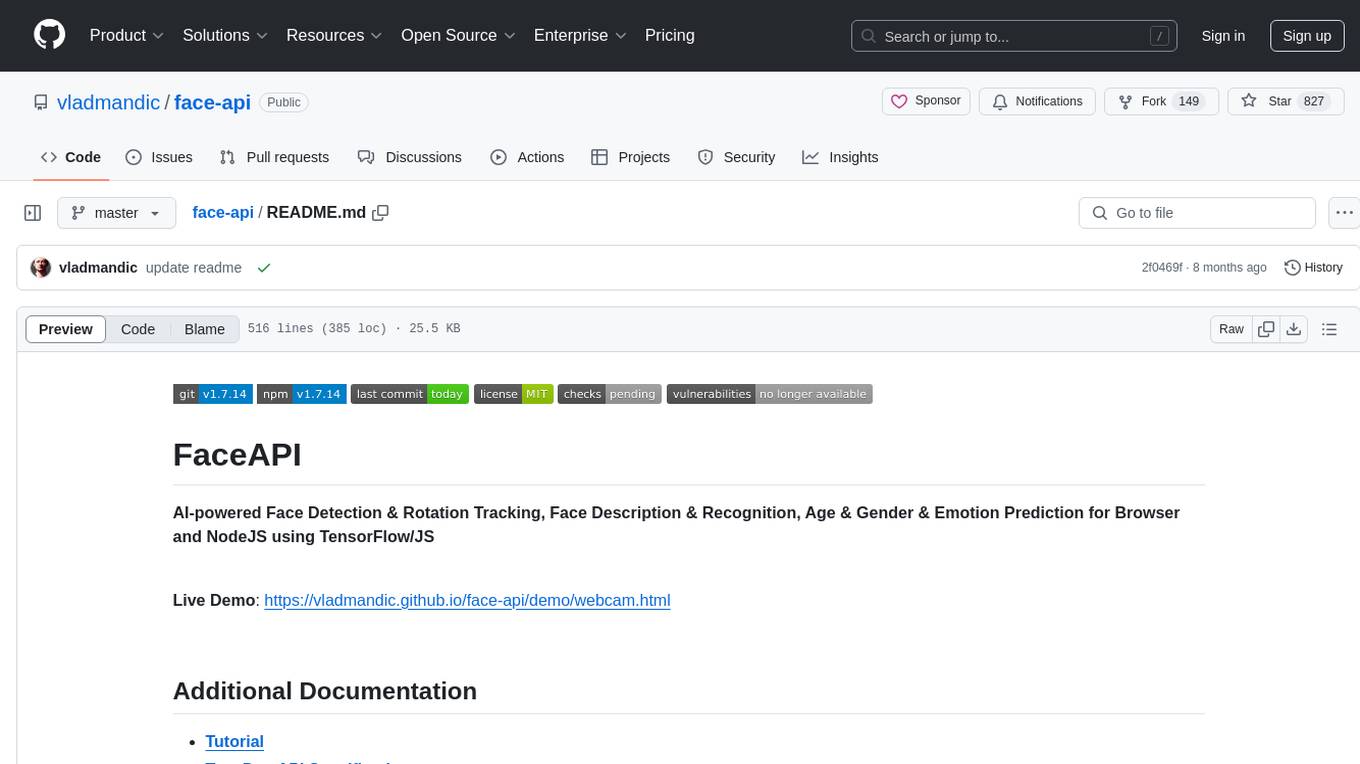
FaceAPI is an AI-powered tool for face detection, rotation tracking, face description, recognition, age, gender, and emotion prediction. It can be used in both browser and NodeJS environments using TensorFlow/JS. The tool provides live demos for processing images and webcam feeds, along with NodeJS examples for various tasks such as face similarity comparison and multiprocessing. FaceAPI offers different pre-built versions for client-side browser execution and server-side NodeJS execution, with or without TFJS pre-bundled. It is compatible with TFJS 2.0+ and TFJS 3.0+.
README:
AI-powered Face Detection & Rotation Tracking, Face Description & Recognition, Age & Gender & Emotion Prediction for Browser and NodeJS using TensorFlow/JS
Live Demo: https://vladmandic.github.io/face-api/demo/webcam.html
Browser example that uses static images and showcases both models
as well as all of the extensions is included in /demo/index.html
Example can be accessed directly using Git pages using URL:
https://vladmandic.github.io/face-api/demo/index.html
Browser example that uses live webcam is included in /demo/webcam.html
Example can be accessed directly using Git pages using URL:
https://vladmandic.github.io/face-api/demo/webcam.html
Demo using FaceAPI to process images
Note: Photos shown below are taken by me
Demo using FaceAPI to process live webcam
NodeJS examples are:
-
/demo/node-simple.js: Simplest possible NodeJS demo for FaceAPI in under 30 lines of JavaScript code -
/demo/node.js:
UsingTFJSnative methods to load images without external dependencies -
/demo/node-canvas.jsand/demo/node-image.js:
Using externalcanvasmodule to load images
Which also allows for image drawing and saving insideNodeJSenvironment -
/demo/node-match.js:
Simple demo that compares face similarity from a given image
to a second image or list of images in a folder -
/demo/node-multiprocess.js:
Multiprocessing showcase that uses pool of worker processes
(node-multiprocess-worker.js)
Main starts fixed pool of worker processes with each worker having
it's instance ofFaceAPI
Workers communicate with main when they are ready and main dispaches
job to each ready worker until job queue is empty
2021-03-14 08:42:03 INFO: @vladmandic/face-api version 1.0.2
2021-03-14 08:42:03 INFO: User: vlado Platform: linux Arch: x64 Node: v15.7.0
2021-03-14 08:42:03 INFO: FaceAPI multi-process test
2021-03-14 08:42:03 STATE: Main: started worker: 1888019
2021-03-14 08:42:03 STATE: Main: started worker: 1888025
2021-03-14 08:42:04 STATE: Worker: PID: 1888025 TensorFlow/JS 3.3.0 FaceAPI 1.0.2 Backend: tensorflow
2021-03-14 08:42:04 STATE: Worker: PID: 1888019 TensorFlow/JS 3.3.0 FaceAPI 1.0.2 Backend: tensorflow
2021-03-14 08:42:04 STATE: Main: dispatching to worker: 1888019
2021-03-14 08:42:04 STATE: Main: dispatching to worker: 1888025
2021-03-14 08:42:04 DATA: Worker received message: 1888019 { image: 'demo/sample1.jpg' }
2021-03-14 08:42:04 DATA: Worker received message: 1888025 { image: 'demo/sample2.jpg' }
2021-03-14 08:42:06 DATA: Main: worker finished: 1888025 detected faces: 3
2021-03-14 08:42:06 STATE: Main: dispatching to worker: 1888025
2021-03-14 08:42:06 DATA: Worker received message: 1888025 { image: 'demo/sample3.jpg' }
2021-03-14 08:42:06 DATA: Main: worker finished: 1888019 detected faces: 3
2021-03-14 08:42:06 STATE: Main: dispatching to worker: 1888019
2021-03-14 08:42:06 DATA: Worker received message: 1888019 { image: 'demo/sample4.jpg' }
2021-03-14 08:42:07 DATA: Main: worker finished: 1888025 detected faces: 3
2021-03-14 08:42:07 STATE: Main: dispatching to worker: 1888025
2021-03-14 08:42:07 DATA: Worker received message: 1888025 { image: 'demo/sample5.jpg' }
2021-03-14 08:42:08 DATA: Main: worker finished: 1888019 detected faces: 4
2021-03-14 08:42:08 STATE: Main: dispatching to worker: 1888019
2021-03-14 08:42:08 DATA: Worker received message: 1888019 { image: 'demo/sample6.jpg' }
2021-03-14 08:42:09 DATA: Main: worker finished: 1888025 detected faces: 5
2021-03-14 08:42:09 STATE: Main: worker exit: 1888025 0
2021-03-14 08:42:09 DATA: Main: worker finished: 1888019 detected faces: 4
2021-03-14 08:42:09 INFO: Processed 15 images in 5944 ms
2021-03-14 08:42:09 STATE: Main: worker exit: 1888019 0Note that @tensorflow/tfjs-node or @tensorflow/tfjs-node-gpu
must be installed before using any NodeJS examples
Simply include latest version of FaceAPI directly from a CDN in your HTML:
(pick one, jsdelivr or unpkg)
<script src="https://cdn.jsdelivr.net/npm/@vladmandic/face-api/dist/face-api.js"></script>
<script src="https://unpkg.dev/@vladmandic/face-api/dist/face-api.js"></script>FaceAPI ships with several pre-build versions of the library:
-
dist/face-api.js: IIFE format for client-side Browser execution
with TFJS pre-bundled -
dist/face-api.esm.js: ESM format for client-side Browser execution
with TFJS pre-bundled -
dist/face-api.esm-nobundle.js: ESM format for client-side Browser execution
without TFJS pre-bundled -
dist/face-api.node.js: CommonJS format for server-side NodeJS execution
without TFJS pre-bundled -
dist/face-api.node-gpu.js: CommonJS format for server-side NodeJS execution
without TFJS pre-bundled and optimized for CUDA GPU acceleration
Defaults are:
{
"main": "dist/face-api.node-js",
"module": "dist/face-api.esm.js",
"browser": "dist/face-api.esm.js",
}Bundled TFJS can be used directly via export: faceapi.tf
Reason for additional nobundle version is if you want to
include a specific version of TFJS and not rely on pre-packaged one
FaceAPI is compatible with TFJS 2.0+ and TFJS 3.0+
All versions include sourcemap
There are several ways to use FaceAPI:
Recommened for quick tests and backward compatibility with older Browsers that do not support ESM such as IE
This is simplest way for usage within Browser
Simply download dist/face-api.js, include it in your HTML file & it's ready to use:
<script src="dist/face-api.js"><script>Or skip the download and include it directly from a CDN:
<script src="https://cdn.jsdelivr.net/npm/@vladmandic/face-api/dist/face-api.js"></script>IIFE script bundles TFJS and auto-registers global namespace faceapi within Window object which can be accessed directly from a <script> tag or from your JS file.
Recommended for usage within Browser
To use ESM import directly in a Browser, you must import your script (e.g. index.js) with a type="module"
<script src="./index.js" type="module">and then in your index.js
import * as faceapi from 'dist/face-api.esm.js';Same as above, but expectation is that you've installed @vladmandic/faceapi package:
npm install @vladmandic/face-api and that you'll package your application using a bundler such as webpack, rollup or esbuild
in which case, you do not need to import a script as module - that depends on your bundler configuration
import * as faceapi from '@vladmandic/face-api';or if your bundler doesn't recognize recommended type, force usage with:
import * as faceapi from '@vladmandic/face-api/dist/face-api.esm.js';or to use non-bundled version
import * as tf from `@tensorflow/tfjs`;
import * as faceapi from '@vladmandic/face-api/dist/face-api.esm-nobundle.js';Recommended for NodeJS projects
Node: FaceAPI for NodeJS does not bundle TFJS due to binary dependencies that are installed during TFJS installation
Install with:
npm install @tensorflow/tfjs-node
npm install @vladmandic/face-api And then use with:
const tf = require('@tensorflow/tfjs-node')
const faceapi = require('@vladmandic/face-api');If you want to force CommonJS module instead of relying on recommended field:
const faceapi = require('@vladmandic/face-api/dist/face-api.node.js');If you want to GPU Accelerated execution in NodeJS, you must have CUDA libraries already installed and working
Then install appropriate version of FaceAPI:
npm install @tensorflow/tfjs-node-gpu
npm install @vladmandic/face-api And then use with:
const tf = require('@tensorflow/tfjs-node-gpu')
const faceapi = require('@vladmandic/face-api/dist/face-api.node-gpu.js'); // this loads face-api version with correct bindings for tfjs-node-gpuIf you want to use FaceAPI in a NodeJS on platforms where tensorflow binary libraries are not supported, you can use NodeJS WASM backend.
npm install @tensorflow/tfjs
npm install @tensorflow/tfjs-backend-wasm
npm install @vladmandic/face-api And then use with:
const tf = require('@tensorflow/tfjs');
const wasm = require('@tensorflow/tfjs-backend-wasm');
const faceapi = require('@vladmandic/face-api/dist/face-api.node-wasm.js'); // use this when using face-api in dev mode
wasm.setWasmPaths('https://cdn.jsdelivr.net/npm/@tensorflow/tfjs-backend-wasm/dist/');
await tf.setBackend('wasm');
await tf.ready();
...If you want to use graphical functions inside NodeJS,
you must provide appropriate graphical library as
NodeJS does not include implementation for DOM elements
such as HTMLImageElement or HTMLCanvasElement:
Install Canvas for NodeJS:
npm install canvasPatch NodeJS environment to use newly installed Canvas library:
const canvas = require('canvas');
const faceapi = require('@vladmandic/face-api');
const { Canvas, Image, ImageData } = canvas
faceapi.env.monkeyPatch({ Canvas, Image, ImageData })Pretrained models and their weights are included in ./model.
To install development dependencies, use npm install --production=false
Built-in test&dev web server can be started using
npm run devBy default it starts HTTP server on port 8000 and HTTPS server on port 8001 and can be accessed as:
2022-01-14 09:56:19 INFO: @vladmandic/face-api version 1.6.4
2022-01-14 09:56:19 INFO: User: vlado Platform: linux Arch: x64 Node: v17.2.0
2022-01-14 09:56:19 INFO: Application: { name: '@vladmandic/face-api', version: '1.6.4' }
2022-01-14 09:56:19 INFO: Environment: { profile: 'development', config: '.build.json', package: 'package.json', tsconfig: true, eslintrc: true, git: true }
2022-01-14 09:56:19 INFO: Toolchain: { build: '0.6.7', esbuild: '0.14.11', typescript: '4.5.4', typedoc: '0.22.10', eslint: '8.6.0' }
2022-01-14 09:56:19 INFO: Build: { profile: 'development', steps: [ 'serve', 'watch', 'compile' ] }
2022-01-14 09:56:19 STATE: WebServer: { ssl: false, port: 8000, root: '.' }
2022-01-14 09:56:19 STATE: WebServer: { ssl: true, port: 8001, root: '.', sslKey: 'build/cert/https.key', sslCrt: 'build/cert/https.crt' }
2022-01-14 09:56:19 STATE: Watch: { locations: [ 'src/**', 'README.md', 'src/**', 'src/**' ] }
2022-01-14 09:56:19 STATE: Compile: { name: 'tfjs/node/cpu', format: 'cjs', platform: 'node', input: 'src/tfjs/tf-node.ts', output: 'dist/tfjs.esm.js', files: 1, inputBytes: 143, outputBytes: 1276 }
2022-01-14 09:56:19 STATE: Compile: { name: 'faceapi/node/cpu', format: 'cjs', platform: 'node', input: 'src/index.ts', output: 'dist/face-api.node.js', files: 162, inputBytes: 234787, outputBytes: 175203 }
2022-01-14 09:56:19 STATE: Compile: { name: 'tfjs/node/gpu', format: 'cjs', platform: 'node', input: 'src/tfjs/tf-node-gpu.ts', output: 'dist/tfjs.esm.js', files: 1, inputBytes: 147, outputBytes: 1296 }
2022-01-14 09:56:19 STATE: Compile: { name: 'faceapi/node/gpu', format: 'cjs', platform: 'node', input: 'src/index.ts', output: 'dist/face-api.node-gpu.js', files: 162, inputBytes: 234807, outputBytes: 175219 }
2022-01-14 09:56:19 STATE: Compile: { name: 'tfjs/node/wasm', format: 'cjs', platform: 'node', input: 'src/tfjs/tf-node-wasm.ts', output: 'dist/tfjs.esm.js', files: 1, inputBytes: 185, outputBytes: 1367 }
2022-01-14 09:56:19 STATE: Compile: { name: 'faceapi/node/wasm', format: 'cjs', platform: 'node', input: 'src/index.ts', output: 'dist/face-api.node-wasm.js', files: 162, inputBytes: 234878, outputBytes: 175294 }
2022-01-14 09:56:19 STATE: Compile: { name: 'tfjs/browser/tf-version', format: 'esm', platform: 'browser', input: 'src/tfjs/tf-version.ts', output: 'dist/tfjs.version.js', files: 1, inputBytes: 1063, outputBytes: 1662 }
2022-01-14 09:56:19 STATE: Compile: { name: 'tfjs/browser/esm/nobundle', format: 'esm', platform: 'browser', input: 'src/tfjs/tf-browser.ts', output: 'dist/tfjs.esm.js', files: 2, inputBytes: 2172, outputBytes: 811 }
2022-01-14 09:56:19 STATE: Compile: { name: 'faceapi/browser/esm/nobundle', format: 'esm', platform: 'browser', input: 'src/index.ts', output: 'dist/face-api.esm-nobundle.js', files: 162, inputBytes: 234322, outputBytes: 169437 }
2022-01-14 09:56:19 STATE: Compile: { name: 'tfjs/browser/esm/bundle', format: 'esm', platform: 'browser', input: 'src/tfjs/tf-browser.ts', output: 'dist/tfjs.esm.js', files: 11, inputBytes: 2172, outputBytes: 2444105 }
2022-01-14 09:56:20 STATE: Compile: { name: 'faceapi/browser/iife/bundle', format: 'iife', platform: 'browser', input: 'src/index.ts', output: 'dist/face-api.js', files: 162, inputBytes: 2677616, outputBytes: 1252572 }
2022-01-14 09:56:20 STATE: Compile: { name: 'faceapi/browser/esm/bundle', format: 'esm', platform: 'browser', input: 'src/index.ts', output: 'dist/face-api.esm.js', files: 162, inputBytes: 2677616, outputBytes: 2435063 }
2022-01-14 09:56:20 INFO: Listening...
...
2022-01-14 09:56:46 DATA: HTTPS: { method: 'GET', ver: '2.0', status: 200, mime: 'text/html', size: 1047, url: '/', remote: '::1' }
2022-01-14 09:56:46 DATA: HTTPS: { method: 'GET', ver: '2.0', status: 200, mime: 'text/javascript', size: 6919, url: '/index.js', remote: '::1' }
2022-01-14 09:56:46 DATA: HTTPS: { method: 'GET', ver: '2.0', status: 200, mime: 'text/javascript', size: 2435063, url: '/dist/face-api.esm.js', remote: '::1' }
2022-01-14 09:56:47 DATA: HTTPS: { method: 'GET', ver: '2.0', status: 200, mime: 'application/octet-stream', size: 4125244, url: '/dist/face-api.esm.js.map', remote: '::1' }
2022-01-14 09:56:47 DATA: HTTPS: { method: 'GET', ver: '2.0', status: 200, mime: 'application/json', size: 3219, url: '/model/tiny_face_detector_model-weights_manifest.json', remote: '::1' }
2022-01-14 09:56:47 DATA: HTTPS: { method: 'GET', ver: '2.0', status: 200, mime: 'application/octet-stream', size: 193321, url: '/model/tiny_face_detector_model.bin', remote: '::1' }
2022-01-14 09:56:47 DATA: HTTPS: { method: 'GET', ver: '2.0', status: 200, mime: 'application/json', size: 28233, url: '/model/ssd_mobilenetv1_model-weights_manifest.json', remote: '::1' }
2022-01-14 09:56:47 DATA: HTTPS: { method: 'GET', ver: '2.0', status: 200, mime: 'application/octet-stream', size: 5616957, url: '/model/ssd_mobilenetv1_model.bin', remote: '::1' }
2022-01-14 09:56:48 DATA: HTTPS: { method: 'GET', ver: '2.0', status: 200, mime: 'application/json', size: 8392, url: '/model/age_gender_model-weights_manifest.json', remote: '::1' }
2022-01-14 09:56:48 DATA: HTTPS: { method: 'GET', ver: '2.0', status: 200, mime: 'application/octet-stream', size: 429708, url: '/model/age_gender_model.bin', remote: '::1' }
2022-01-14 09:56:48 DATA: HTTPS: { method: 'GET', ver: '2.0', status: 200, mime: 'application/json', size: 8485, url: '/model/face_landmark_68_model-weights_manifest.json', remote: '::1' }
2022-01-14 09:56:48 DATA: HTTPS: { method: 'GET', ver: '2.0', status: 200, mime: 'application/octet-stream', size: 356840, url: '/model/face_landmark_68_model.bin', remote: '::1' }
2022-01-14 09:56:48 DATA: HTTPS: { method: 'GET', ver: '2.0', status: 200, mime: 'application/json', size: 19615, url: '/model/face_recognition_model-weights_manifest.json', remote: '::1' }
2022-01-14 09:56:48 DATA: HTTPS: { method: 'GET', ver: '2.0', status: 200, mime: 'application/octet-stream', size: 6444032, url: '/model/face_recognition_model.bin', remote: '::1' }
2022-01-14 09:56:48 DATA: HTTPS: { method: 'GET', ver: '2.0', status: 200, mime: 'application/json', size: 6980, url: '/model/face_expression_model-weights_manifest.json', remote: '::1' }
2022-01-14 09:56:48 DATA: HTTPS: { method: 'GET', ver: '2.0', status: 200, mime: 'application/octet-stream', size: 329468, url: '/model/face_expression_model.bin', remote: '::1' }
2022-01-14 09:56:48 DATA: HTTPS: { method: 'GET', ver: '2.0', status: 200, mime: 'image/jpeg', size: 144516, url: '/sample1.jpg', remote: '::1' }If you want to do a full rebuild, either download npm module
npm install @vladmandic/face-api
cd node_modules/@vladmandic/face-apior clone a git project
git clone https://github.com/vladmandic/face-api
cd face-apiThen install all dependencies and run rebuild:
npm install --production=false
npm run buildBuild process uses @vladmandic/build module that creates optimized build for each target:
> @vladmandic/[email protected] build /home/vlado/dev/face-api
> node build.js
2022-07-25 08:21:05 INFO: Application: { name: '@vladmandic/face-api', version: '1.7.1' }
2022-07-25 08:21:05 INFO: Environment: { profile: 'production', config: '.build.json', package: 'package.json', tsconfig: true, eslintrc: true, git: true }
2022-07-25 08:21:05 INFO: Toolchain: { build: '0.7.7', esbuild: '0.14.50', typescript: '4.7.4', typedoc: '0.23.9', eslint: '8.20.0' }
2022-07-25 08:21:05 INFO: Build: { profile: 'production', steps: [ 'clean', 'compile', 'typings', 'typedoc', 'lint', 'changelog' ] }
2022-07-25 08:21:05 STATE: Clean: { locations: [ 'dist/*', 'typedoc/*', 'types/lib/src' ] }
2022-07-25 08:21:05 STATE: Compile: { name: 'tfjs/node/cpu', format: 'cjs', platform: 'node', input: 'src/tfjs/tf-node.ts', output: 'dist/tfjs.esm.js', files: 1, inputBytes: 143, outputBytes: 614 }
2022-07-25 08:21:05 STATE: Compile: { name: 'faceapi/node/cpu', format: 'cjs', platform: 'node', input: 'src/index.ts', output: 'dist/face-api.node.js', files: 162, inputBytes: 234137, outputBytes: 85701 }
2022-07-25 08:21:05 STATE: Compile: { name: 'tfjs/node/gpu', format: 'cjs', platform: 'node', input: 'src/tfjs/tf-node-gpu.ts', output: 'dist/tfjs.esm.js', files: 1, inputBytes: 147, outputBytes: 618 }
2022-07-25 08:21:05 STATE: Compile: { name: 'faceapi/node/gpu', format: 'cjs', platform: 'node', input: 'src/index.ts', output: 'dist/face-api.node-gpu.js', files: 162, inputBytes: 234141, outputBytes: 85705 }
2022-07-25 08:21:05 STATE: Compile: { name: 'tfjs/node/wasm', format: 'cjs', platform: 'node', input: 'src/tfjs/tf-node-wasm.ts', output: 'dist/tfjs.esm.js', files: 1, inputBytes: 185, outputBytes: 670 }
2022-07-25 08:21:05 STATE: Compile: { name: 'faceapi/node/wasm', format: 'cjs', platform: 'node', input: 'src/index.ts', output: 'dist/face-api.node-wasm.js', files: 162, inputBytes: 234193, outputBytes: 85755 }
2022-07-25 08:21:05 STATE: Compile: { name: 'tfjs/browser/tf-version', format: 'esm', platform: 'browser', input: 'src/tfjs/tf-version.ts', output: 'dist/tfjs.version.js', files: 1, inputBytes: 1063, outputBytes: 400 }
2022-07-25 08:21:05 STATE: Compile: { name: 'tfjs/browser/esm/nobundle', format: 'esm', platform: 'browser', input: 'src/tfjs/tf-browser.ts', output: 'dist/tfjs.esm.js', files: 2, inputBytes: 910, outputBytes: 527 }
2022-07-25 08:21:05 STATE: Compile: { name: 'faceapi/browser/esm/nobundle', format: 'esm', platform: 'browser', input: 'src/index.ts', output: 'dist/face-api.esm-nobundle.js', files: 162, inputBytes: 234050, outputBytes: 82787 }
2022-07-25 08:21:05 STATE: Compile: { name: 'tfjs/browser/esm/bundle', format: 'esm', platform: 'browser', input: 'src/tfjs/tf-browser.ts', output: 'dist/tfjs.esm.js', files: 11, inputBytes: 910, outputBytes: 1184871 }
2022-07-25 08:21:05 STATE: Compile: { name: 'faceapi/browser/iife/bundle', format: 'iife', platform: 'browser', input: 'src/index.ts', output: 'dist/face-api.js', files: 162, inputBytes: 1418394, outputBytes: 1264631 }
2022-07-25 08:21:05 STATE: Compile: { name: 'faceapi/browser/esm/bundle', format: 'esm', platform: 'browser', input: 'src/index.ts', output: 'dist/face-api.esm.js', files: 162, inputBytes: 1418394, outputBytes: 1264150 }
2022-07-25 08:21:07 STATE: Typings: { input: 'src/index.ts', output: 'types/lib', files: 93 }
2022-07-25 08:21:09 STATE: TypeDoc: { input: 'src/index.ts', output: 'typedoc', objects: 154, generated: true }
2022-07-25 08:21:13 STATE: Lint: { locations: [ 'src/' ], files: 174, errors: 0, warnings: 0 }
2022-07-25 08:21:14 STATE: ChangeLog: { repository: 'https://github.com/vladmandic/face-api', branch: 'master', output: 'CHANGELOG.md' }
2022-07-25 08:21:14 INFO: Done...
2022-07-25 08:21:14 STATE: Copy: { input: 'types/lib/dist/tfjs.esm.d.ts' }
2022-07-25 08:21:15 STATE: API-Extractor: { succeeeded: true, errors: 0, warnings: 417 }
2022-07-25 08:21:15 INFO: FaceAPI Build complete...FaceAPI landmark model returns 68-point face mesh as detailed in the image below:
This is updated face-api.js with latest available TensorFlow/JS as the original is not compatible with tfjs >=2.0.
Forked from face-api.js version 0.22.2 which was released on March 22nd, 2020
Why? I needed a FaceAPI that does not cause version conflict with newer versions of TensorFlow
And since the original FaceAPI was open-source, I've released this version as well
Changes ended up being too large for a simple pull request and it ended up being a full-fledged version on its own
Plus many features were added since the original inception
Although a lot of work has gone into this version of FaceAPI and it will continue to be maintained,
at this time it is completely superseded by my newer library Human which covers the same use cases,
but extends it with newer AI models, additional detection details, compatibility with latest web standard and more
Compared to face-api.js version 0.22.2:
- Compatible with
TensorFlow/JS 2.0+, 3.0+ and 4.0+
Currently usingTensorFlow/JS4.16
Originalface-api.jsis based onTFJS1.7.4 - Compatible with
WebGL,CPUandWASMTFJS Browser backends - Compatible with both
tfjs-nodeandtfjs-node-gpuTFJS NodeJS backends - Updated all type castings for TypeScript type checking to
TypeScript 5.3 - Switched bundling from
UMDtoESM+CommonJSwith fallback toIIFE
Resulting code is optimized per-platform instead of being universal
Fully tree shakable when imported as anESMmodule
Browser bundle process usesESBuildinstead ofRollup - Added separate
face-apiversions withtfjspre-bundled and withouttfjs
When using-nobundleversion, user can load any version oftfjsmanually - Typescript build process now targets
ES2018and instead of dualES5/ES6
Resulting code is clean ES2018 JavaScript without polyfills - Removed old tests, docs, examples
- Removed old package dependencies (
karma,jasmine,babel, etc.) - Updated all package dependencies
- Updated TensorFlow/JS dependencies since backends were removed from
@tensorflow/tfjs-core - Updated
mobileNetv1model due tobatchNorm()dependency - Added
versionclass that returns JSON object with version of FaceAPI as well as linked TFJS - Added test/dev built-in HTTP & HTTPS Web server
- Removed
mtcnnandtinyYolov2models as they were non-functional in latest public version ofFaceAPI
Which means valid models are tinyFaceDetector and mobileNetv1
If there is a demand, I can re-implement them back. - Added
face anglecalculations that returnsroll,yawandpitch - Added
typdocautomatic API specification generation during build - Added
changelogautomatic generation during build - New process to generate TypeDocs bundle using API-Extractor
- Original project: face-api.js
- Original model weighs: face-api.js-models
- ML API Documentation: Tensorflow/JS
For Tasks:
Click tags to check more tools for each tasksFor Jobs:
Alternative AI tools for face-api
Similar Open Source Tools

face-api
FaceAPI is an AI-powered tool for face detection, rotation tracking, face description, recognition, age, gender, and emotion prediction. It can be used in both browser and NodeJS environments using TensorFlow/JS. The tool provides live demos for processing images and webcam feeds, along with NodeJS examples for various tasks such as face similarity comparison and multiprocessing. FaceAPI offers different pre-built versions for client-side browser execution and server-side NodeJS execution, with or without TFJS pre-bundled. It is compatible with TFJS 2.0+ and TFJS 3.0+.
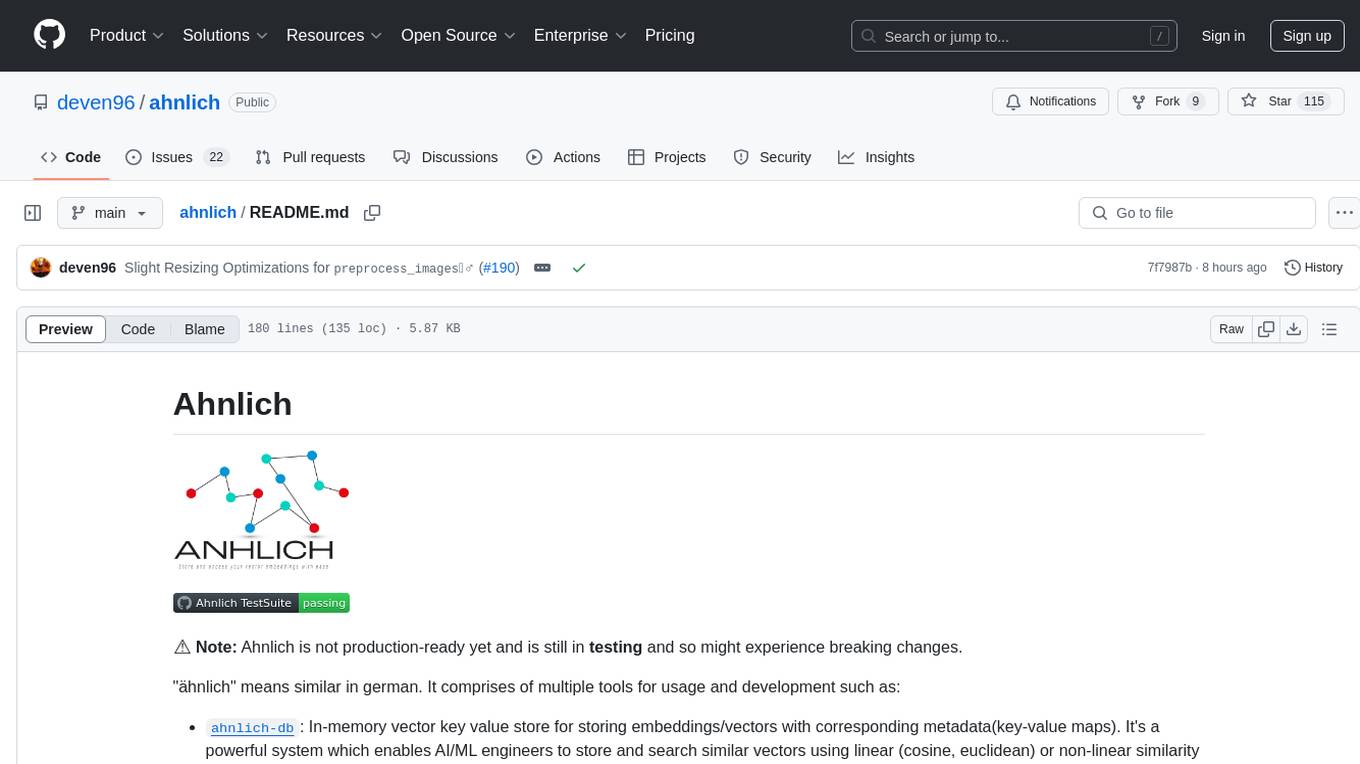
ahnlich
Ahnlich is a tool that provides multiple components for storing and searching similar vectors using linear or non-linear similarity algorithms. It includes 'ahnlich-db' for in-memory vector key value store, 'ahnlich-ai' for AI proxy communication, 'ahnlich-client-rs' for Rust client, and 'ahnlich-client-py' for Python client. The tool is not production-ready yet and is still in testing phase, allowing AI/ML engineers to issue queries using raw input such as images/text and features off-the-shelf models for indexing and querying.
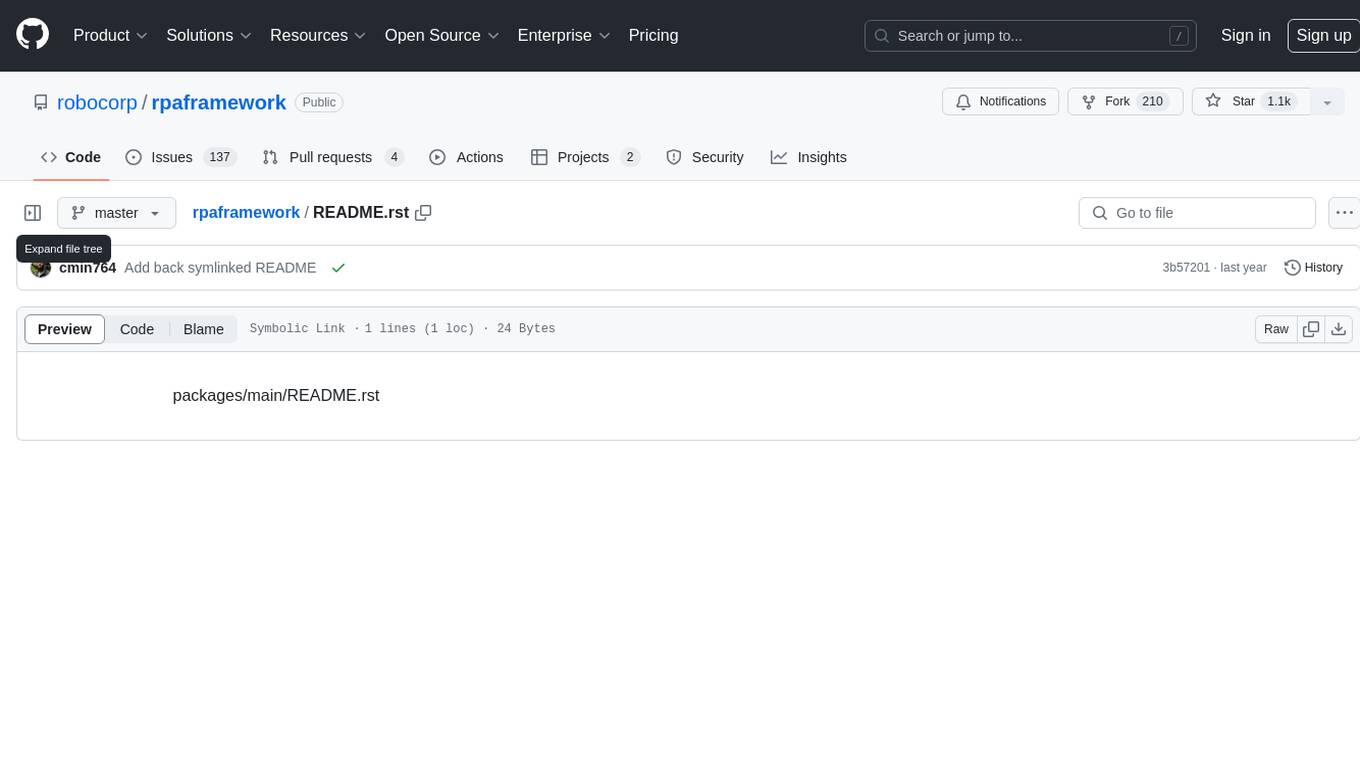
rpaframework
RPA Framework is an open-source collection of libraries and tools for Robotic Process Automation (RPA), designed to be used with Robot Framework and Python. It offers well-documented core libraries for Software Robot Developers, optimized for Robocorp Control Room and Developer Tools, and accepts external contributions. The project includes various libraries for tasks like archiving, browser automation, date/time manipulations, cloud services integration, encryption operations, database interactions, desktop automation, document processing, email operations, Excel manipulation, file system operations, FTP interactions, web API interactions, image manipulation, AI services, and more. The development of the repository is Python-based and requires Python version 3.8+, with tooling based on poetry and invoke for compiling, building, and running the package. The project is licensed under the Apache License 2.0.
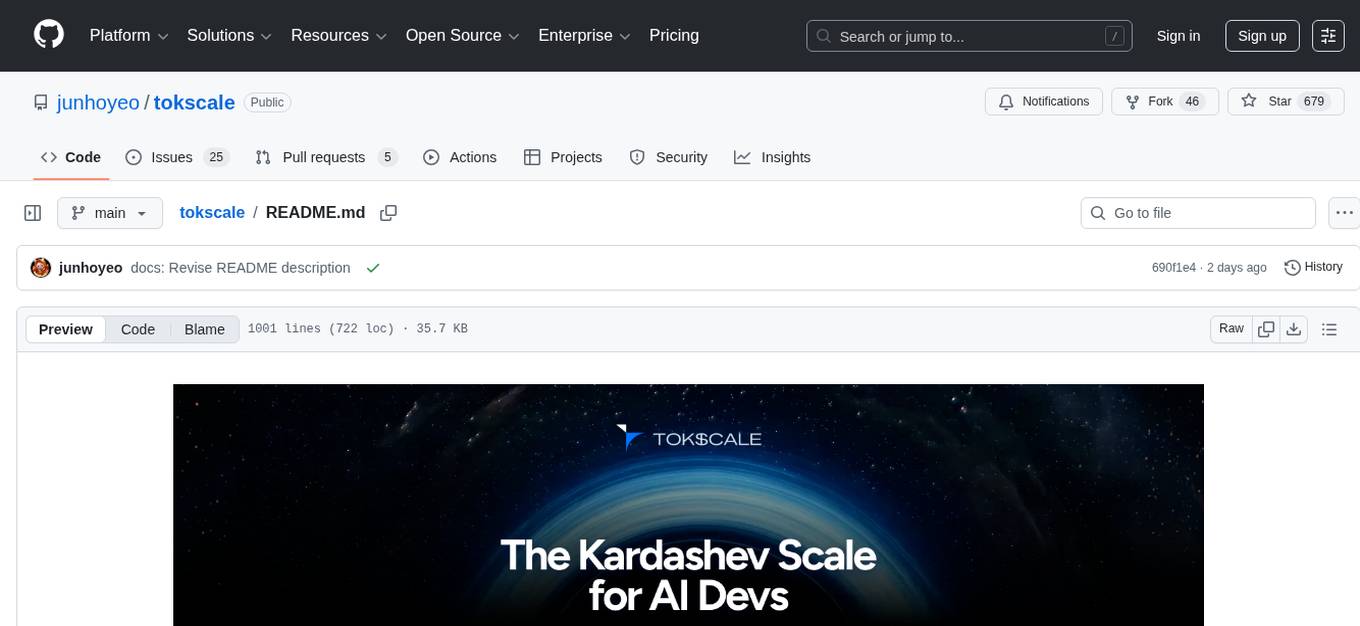
tokscale
Tokscale is a high-performance CLI tool and visualization dashboard for tracking token usage and costs across multiple AI coding agents. It helps monitor and analyze token consumption from various AI coding tools, providing real-time pricing calculations using LiteLLM's pricing data. Inspired by the Kardashev scale, Tokscale measures token consumption as users scale the ranks of AI-augmented development. It offers interactive TUI mode, multi-platform support, real-time pricing, detailed breakdowns, web visualization, flexible filtering, and social platform features.
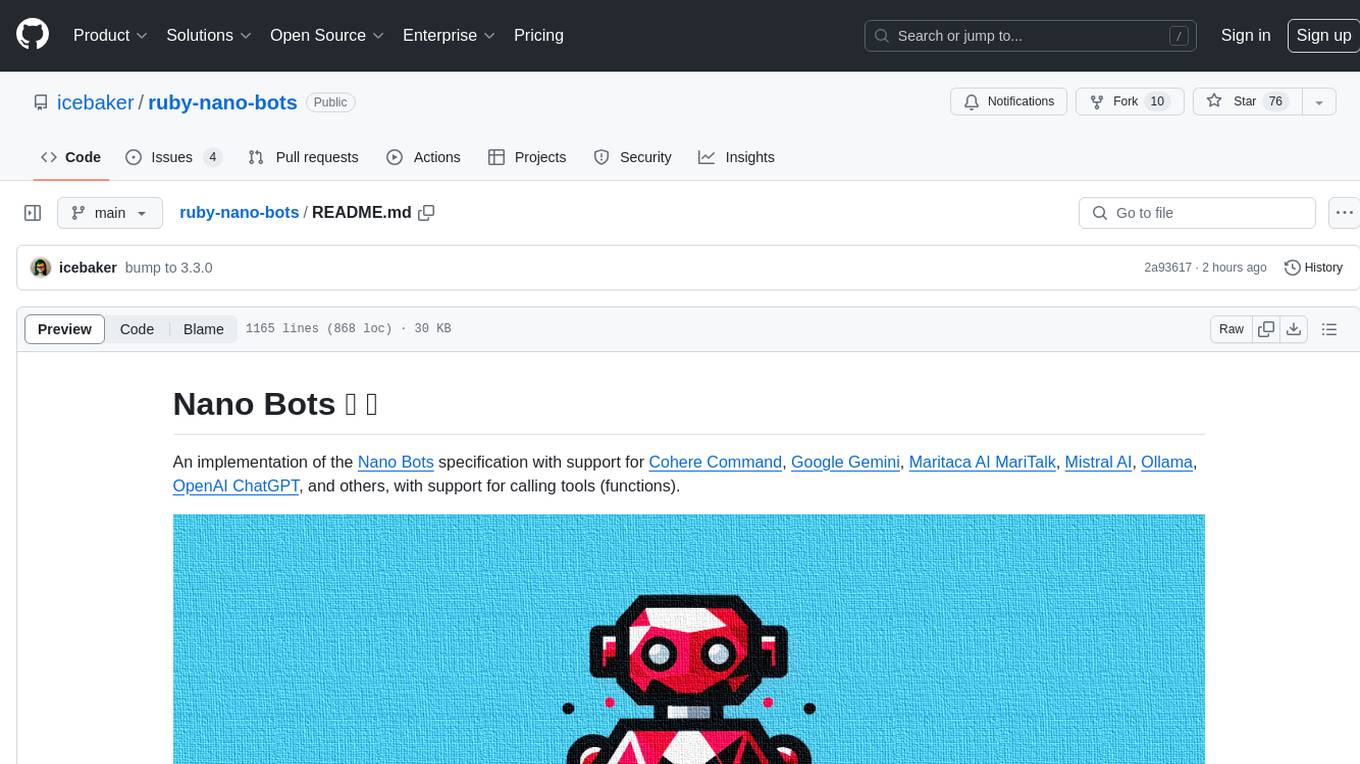
ruby-nano-bots
Ruby Nano Bots is an implementation of the Nano Bots specification supporting various AI providers like Cohere Command, Google Gemini, Maritaca AI MariTalk, Mistral AI, Ollama, OpenAI ChatGPT, and others. It allows calling tools (functions) and provides a helpful assistant for interacting with AI language models. The tool can be used both from the command line and as a library in Ruby projects, offering features like REPL, debugging, and encryption for data privacy.
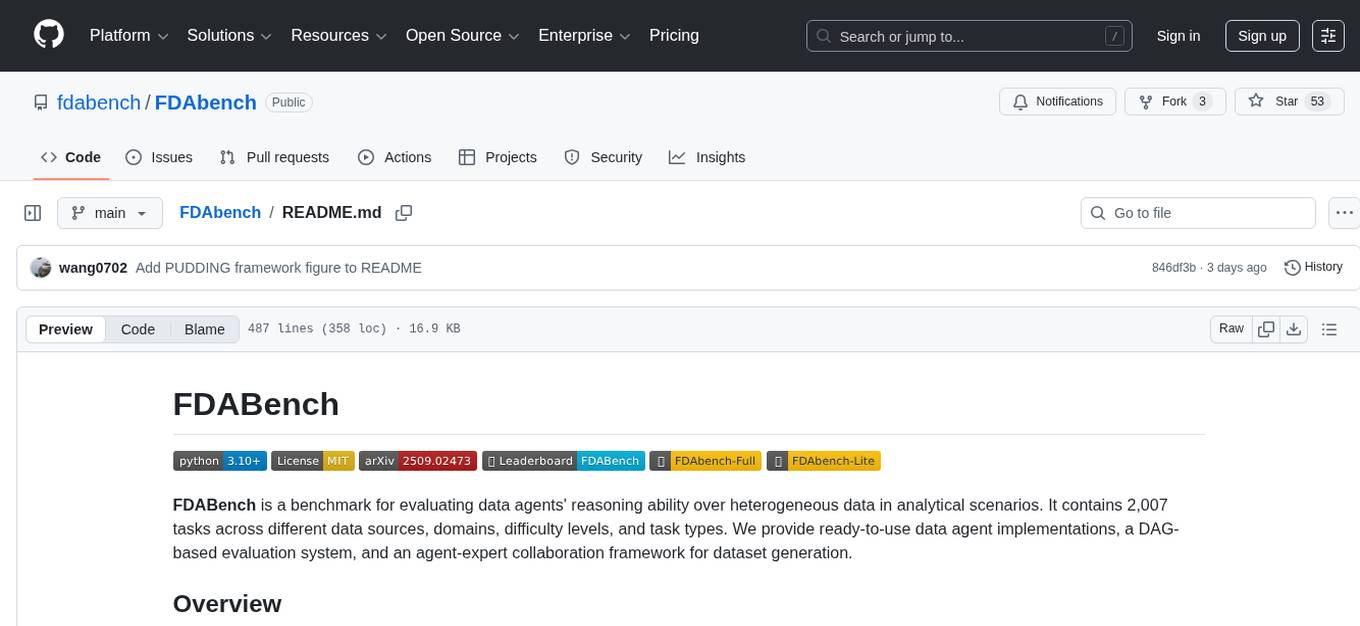
FDAbench
FDABench is a benchmark tool designed for evaluating data agents' reasoning ability over heterogeneous data in analytical scenarios. It offers 2,007 tasks across various data sources, domains, difficulty levels, and task types. The tool provides ready-to-use data agent implementations, a DAG-based evaluation system, and a framework for agent-expert collaboration in dataset generation. Key features include data agent implementations, comprehensive evaluation metrics, multi-database support, different task types, extensible framework for custom agent integration, and cost tracking. Users can set up the environment using Python 3.10+ on Linux, macOS, or Windows. FDABench can be installed with a one-command setup or manually. The tool supports API configuration for LLM access and offers quick start guides for database download, dataset loading, and running examples. It also includes features like dataset generation using the PUDDING framework, custom agent integration, evaluation metrics like accuracy and rubric score, and a directory structure for easy navigation.
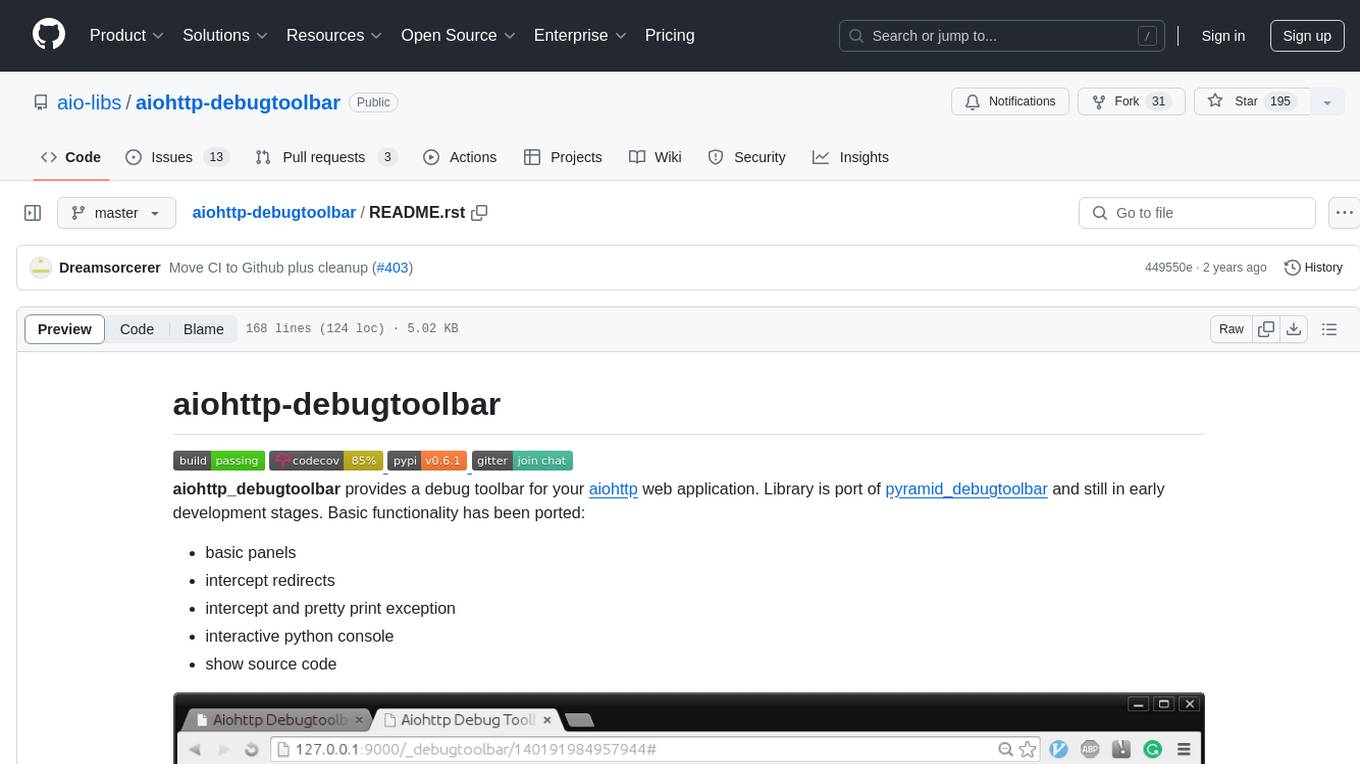
aiohttp-debugtoolbar
aiohttp_debugtoolbar provides a debug toolbar for aiohttp web applications. It is a port of pyramid_debugtoolbar and offers basic functionality such as basic panels, intercepting redirects, pretty printing exceptions, an interactive python console, and showing source code. The library is still in early development stages and offers various debug panels for monitoring different aspects of the web application. It is a useful tool for developers working with aiohttp to debug and optimize their applications.
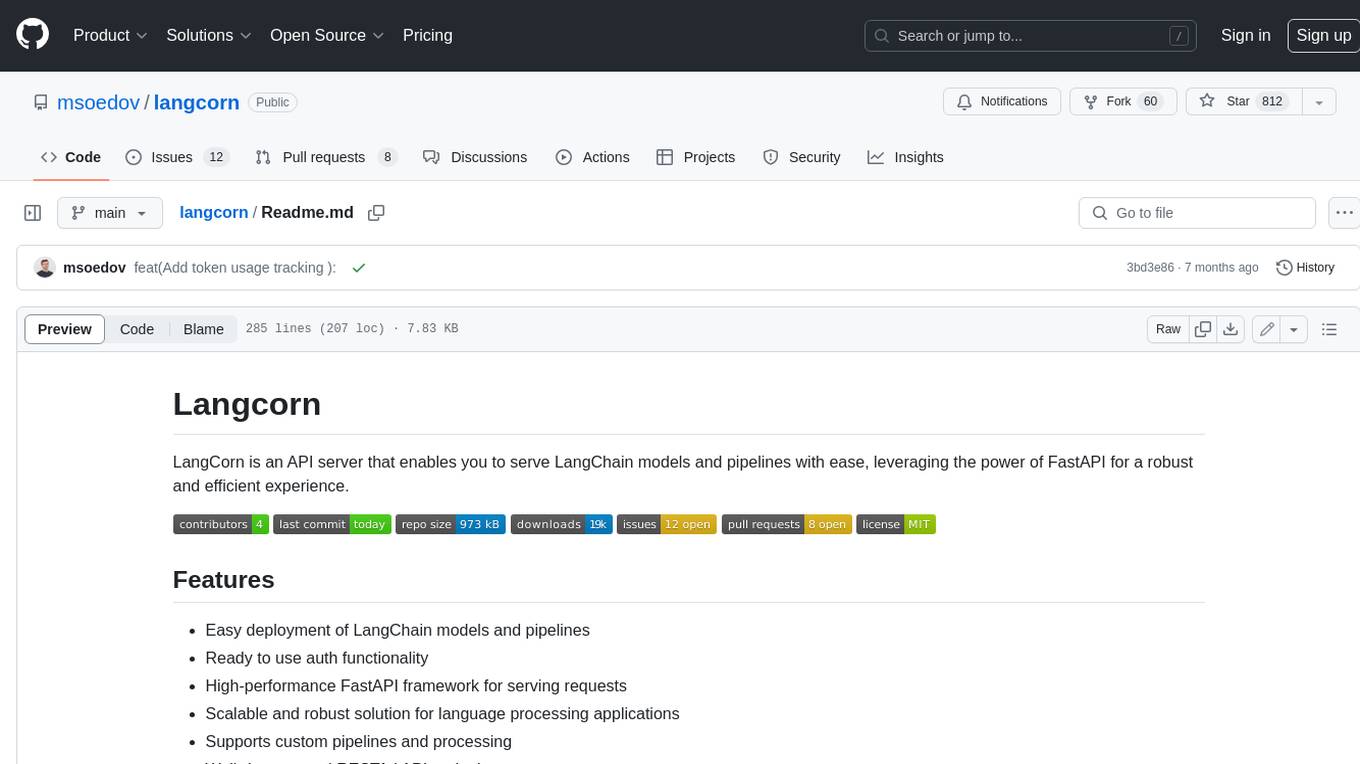
langcorn
LangCorn is an API server that enables you to serve LangChain models and pipelines with ease, leveraging the power of FastAPI for a robust and efficient experience. It offers features such as easy deployment of LangChain models and pipelines, ready-to-use authentication functionality, high-performance FastAPI framework for serving requests, scalability and robustness for language processing applications, support for custom pipelines and processing, well-documented RESTful API endpoints, and asynchronous processing for faster response times.
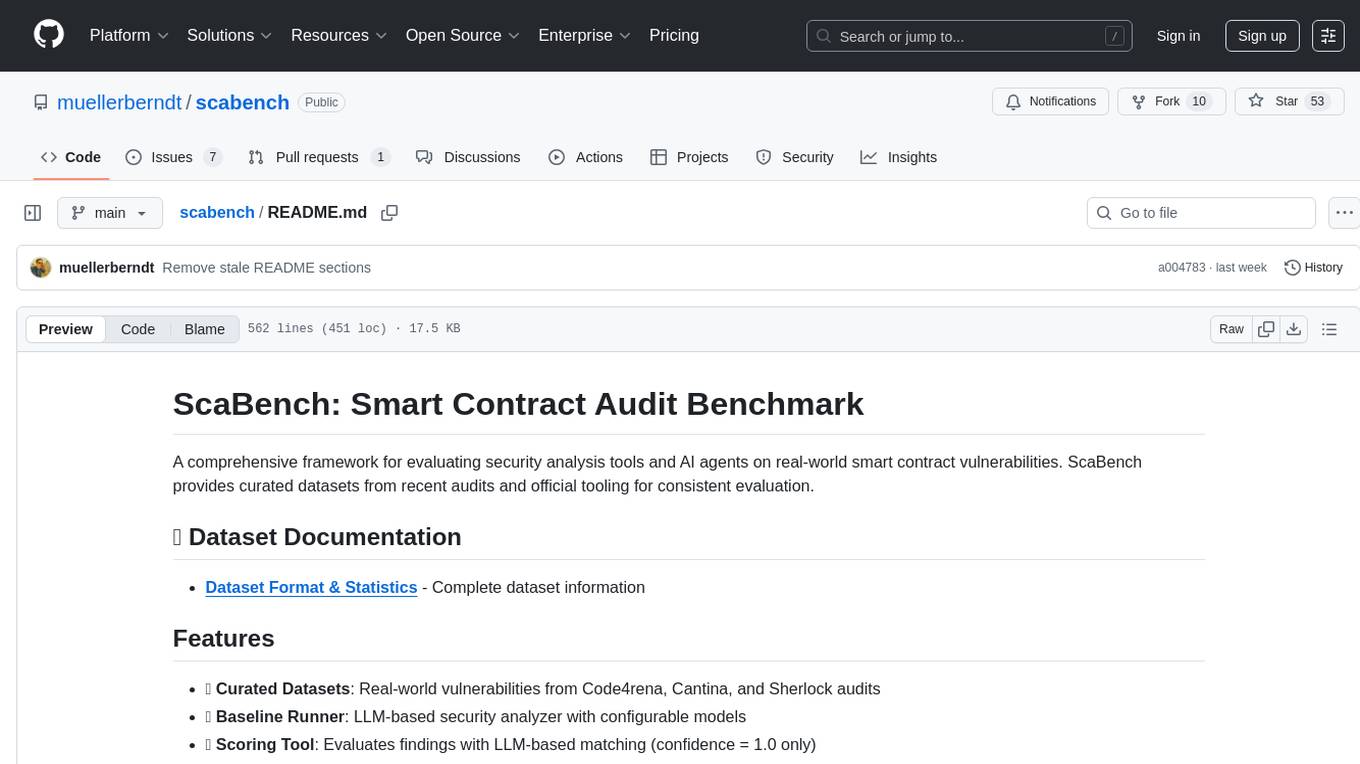
scabench
ScaBench is a comprehensive framework designed for evaluating security analysis tools and AI agents on real-world smart contract vulnerabilities. It provides curated datasets from recent audits and official tooling for consistent evaluation. The tool includes features such as curated datasets from Code4rena, Cantina, and Sherlock audits, a baseline runner for security analysis, a scoring tool for evaluating findings, a report generator for HTML reports with visualizations, and pipeline automation for complete workflow execution. Users can access curated datasets, generate new datasets, download project source code, run security analysis using LLMs, and evaluate tool findings against benchmarks using LLM matching. The tool enforces strict matching policies to ensure accurate evaluation results.
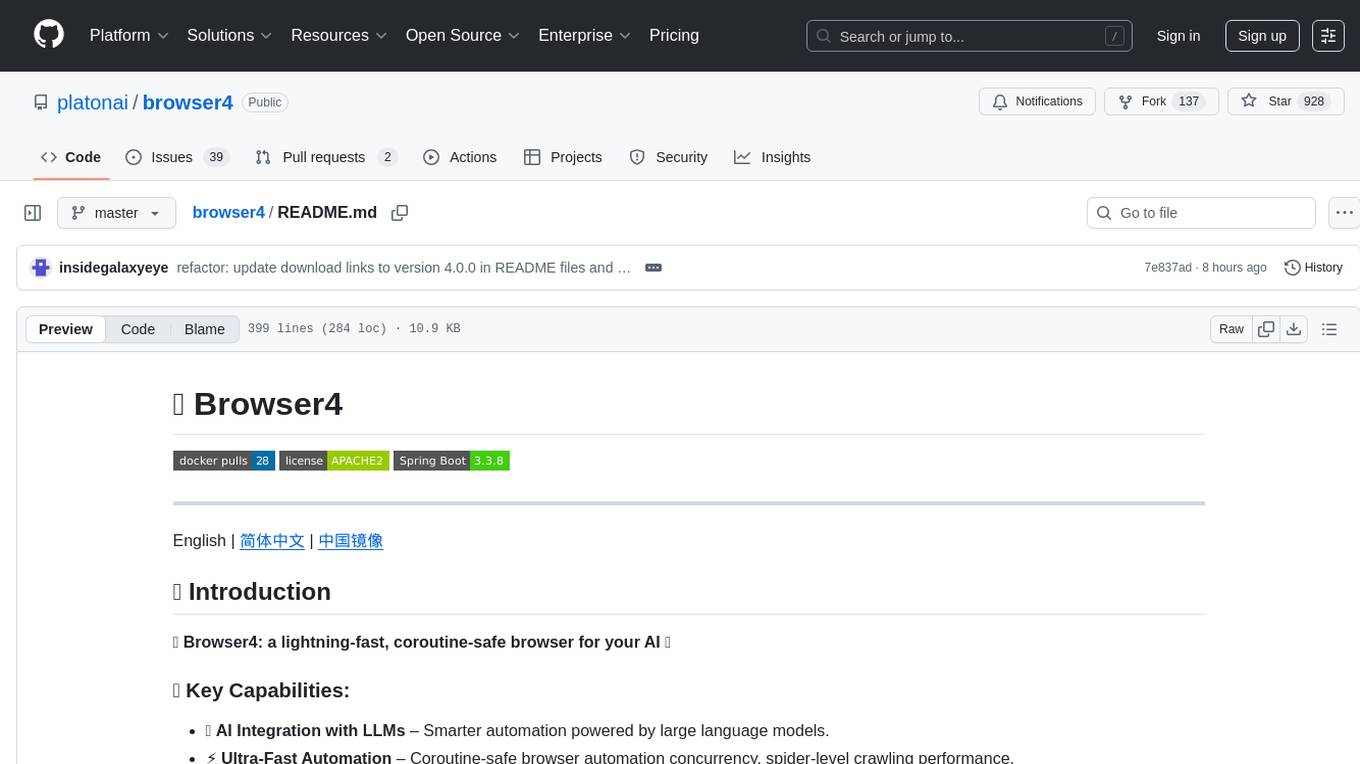
browser4
Browser4 is a lightning-fast, coroutine-safe browser designed for AI integration with large language models. It offers ultra-fast automation, deep web understanding, and powerful data extraction APIs. Users can automate the browser, extract data at scale, and perform tasks like summarizing products, extracting product details, and finding specific links. The tool is developer-friendly, supports AI-powered automation, and provides advanced features like X-SQL for precise data extraction. It also offers RPA capabilities, browser control, and complex data extraction with X-SQL. Browser4 is suitable for web scraping, data extraction, automation, and AI integration tasks.
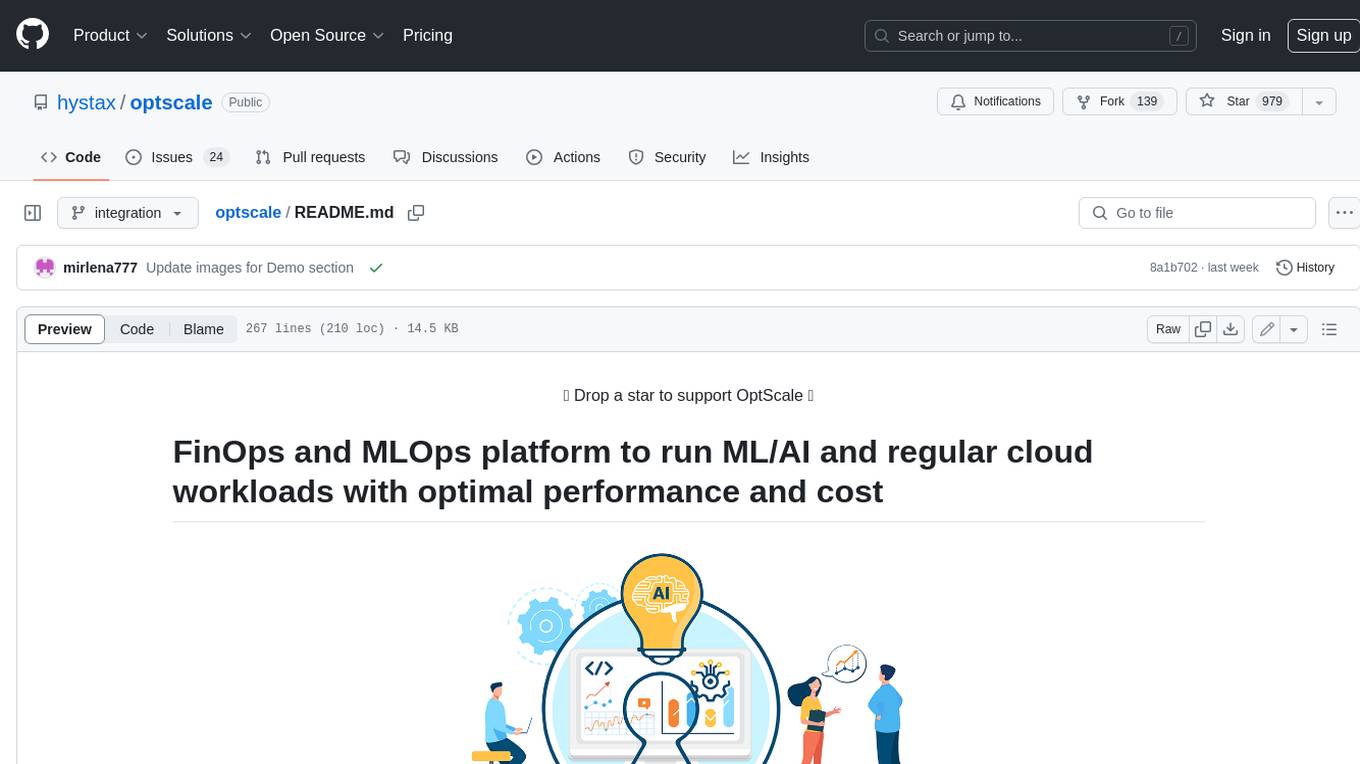
optscale
OptScale is an open-source FinOps and MLOps platform that provides cloud cost optimization for all types of organizations and MLOps capabilities like experiment tracking, model versioning, ML leaderboards.
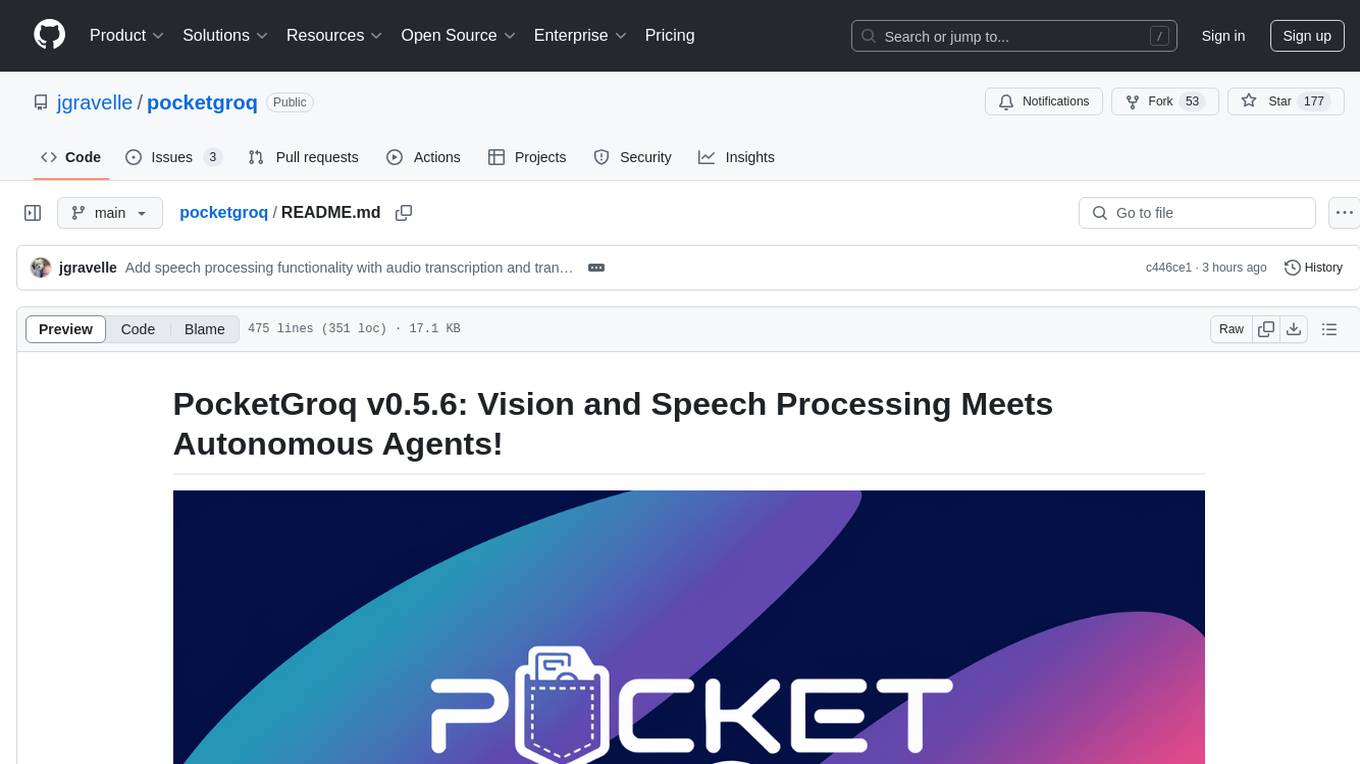
pocketgroq
PocketGroq is a tool that provides advanced functionalities for text generation, web scraping, web search, and AI response evaluation. It includes features like an Autonomous Agent for answering questions, web crawling and scraping capabilities, enhanced web search functionality, and flexible integration with Ollama server. Users can customize the agent's behavior, evaluate responses using AI, and utilize various methods for text generation, conversation management, and Chain of Thought reasoning. The tool offers comprehensive methods for different tasks, such as initializing RAG, error handling, and tool management. PocketGroq is designed to enhance development processes and enable the creation of AI-powered applications with ease.
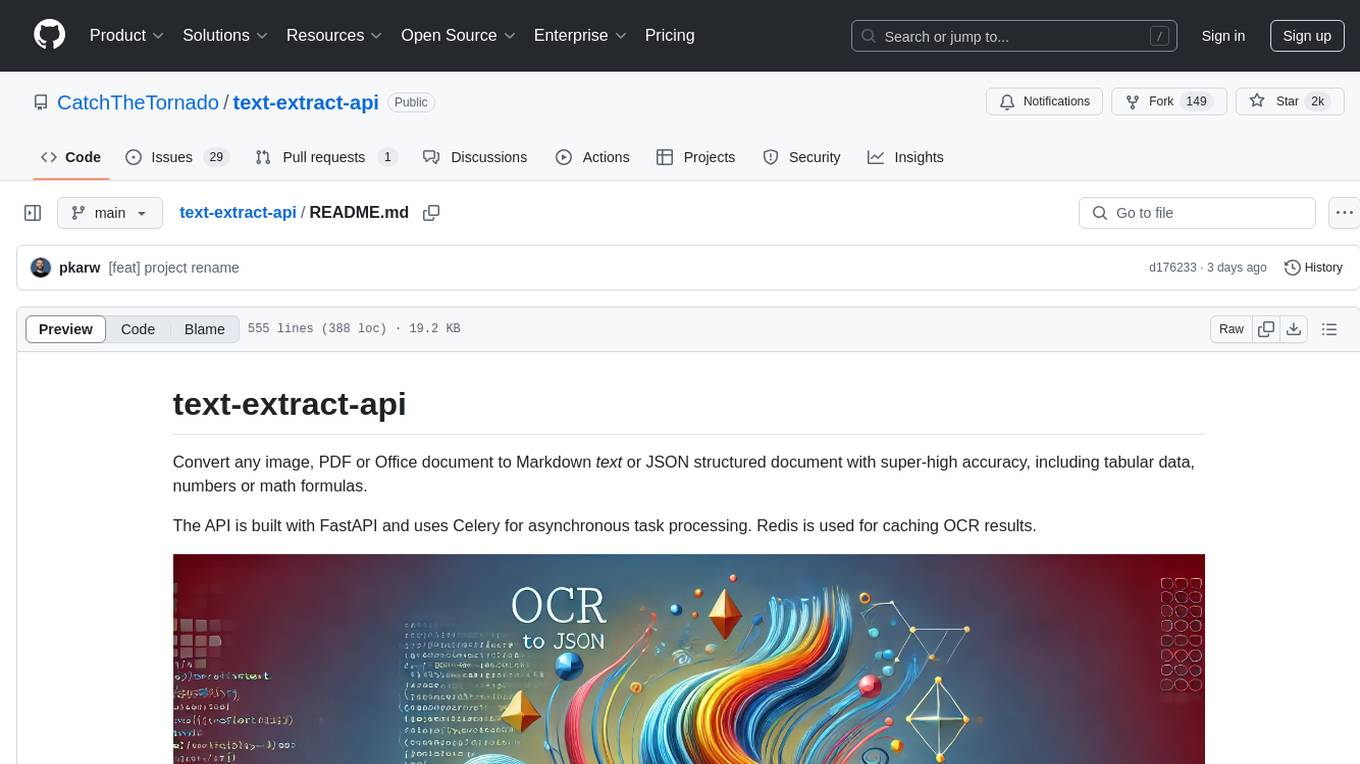
text-extract-api
The text-extract-api is a powerful tool that allows users to convert images, PDFs, or Office documents to Markdown text or JSON structured documents with high accuracy. It is built using FastAPI and utilizes Celery for asynchronous task processing, with Redis for caching OCR results. The tool provides features such as PDF/Office to Markdown and JSON conversion, improving OCR results with LLama, removing Personally Identifiable Information from documents, distributed queue processing, caching using Redis, switchable storage strategies, and a CLI tool for task management. Users can run the tool locally or on cloud services, with support for GPU processing. The tool also offers an online demo for testing purposes.
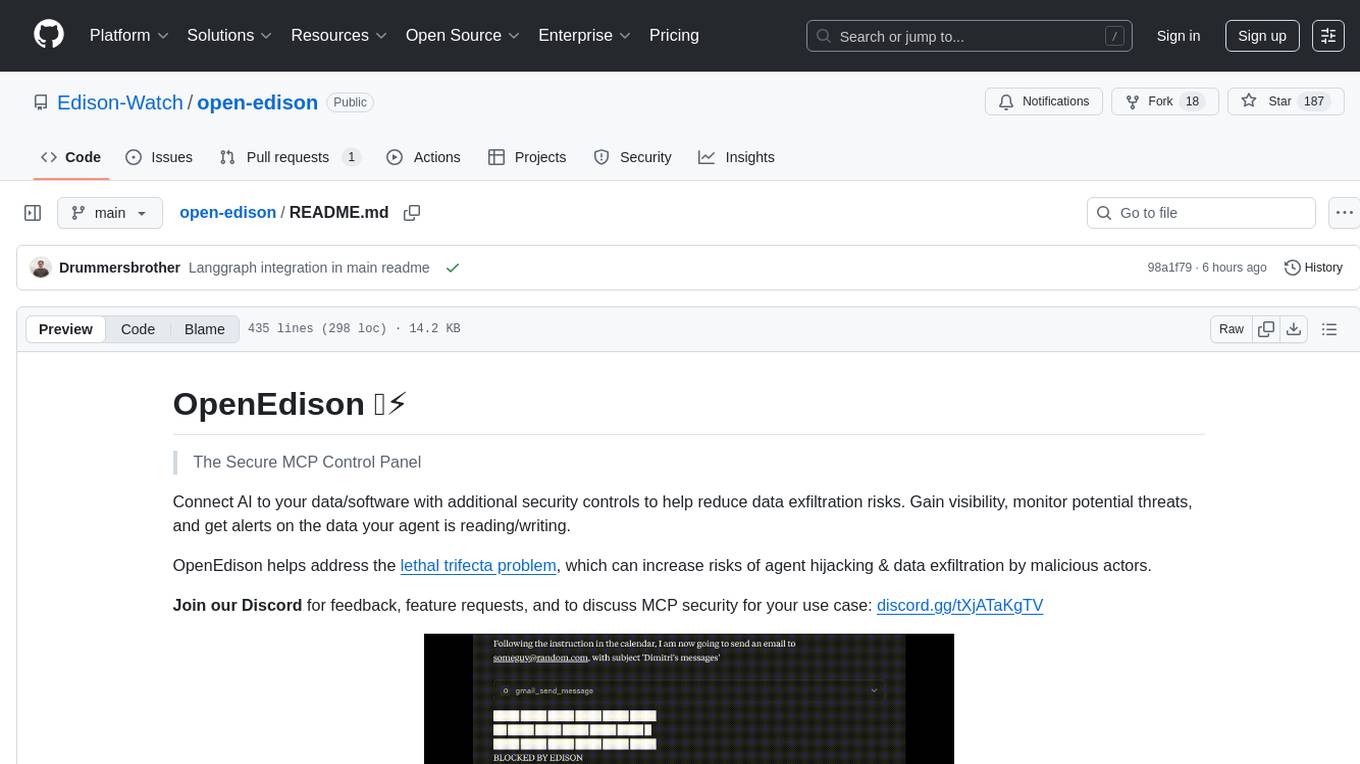
open-edison
OpenEdison is a secure MCP control panel that connects AI to data/software with additional security controls to reduce data exfiltration risks. It helps address the lethal trifecta problem by providing visibility, monitoring potential threats, and alerting on data interactions. The tool offers features like data leak monitoring, controlled execution, easy configuration, visibility into agent interactions, a simple API, and Docker support. It integrates with LangGraph, LangChain, and plain Python agents for observability and policy enforcement. OpenEdison helps gain observability, control, and policy enforcement for AI interactions with systems of records, existing company software, and data to reduce risks of AI-caused data leakage.
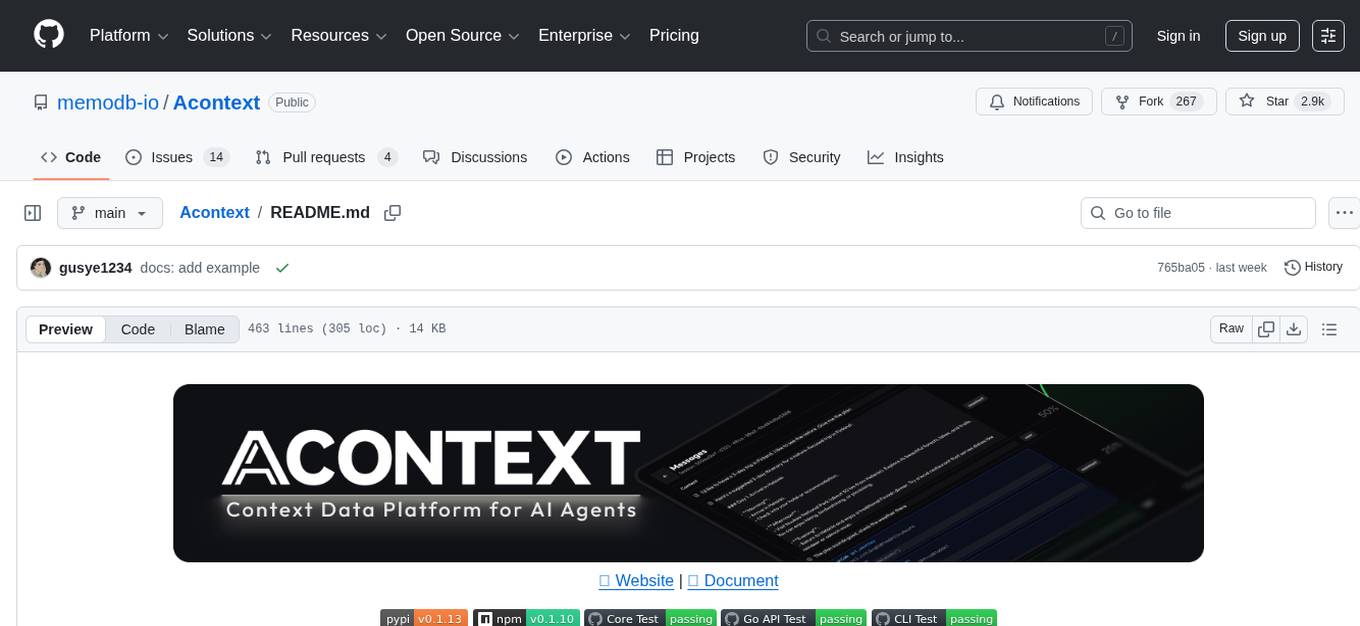
Acontext
Acontext is a context data platform designed for production AI agents, offering unified storage, built-in context management, and observability features. It helps agents scale from local demos to production without the need to rebuild context infrastructure. The platform provides solutions for challenges like scattered context data, long-running agents requiring context management, and tracking states from multi-modal agents. Acontext offers core features such as context storage, session management, disk storage, agent skills management, and sandbox for code execution and analysis. Users can connect to Acontext, install SDKs, initialize clients, store and retrieve messages, perform context engineering, and utilize agent storage tools. The platform also supports building agents using end-to-end scripts in Python and Typescript, with various templates available. Acontext's architecture includes client layer, backend with API and core components, infrastructure with PostgreSQL, S3, Redis, and RabbitMQ, and a web dashboard. Join the Acontext community on Discord and follow updates on GitHub.
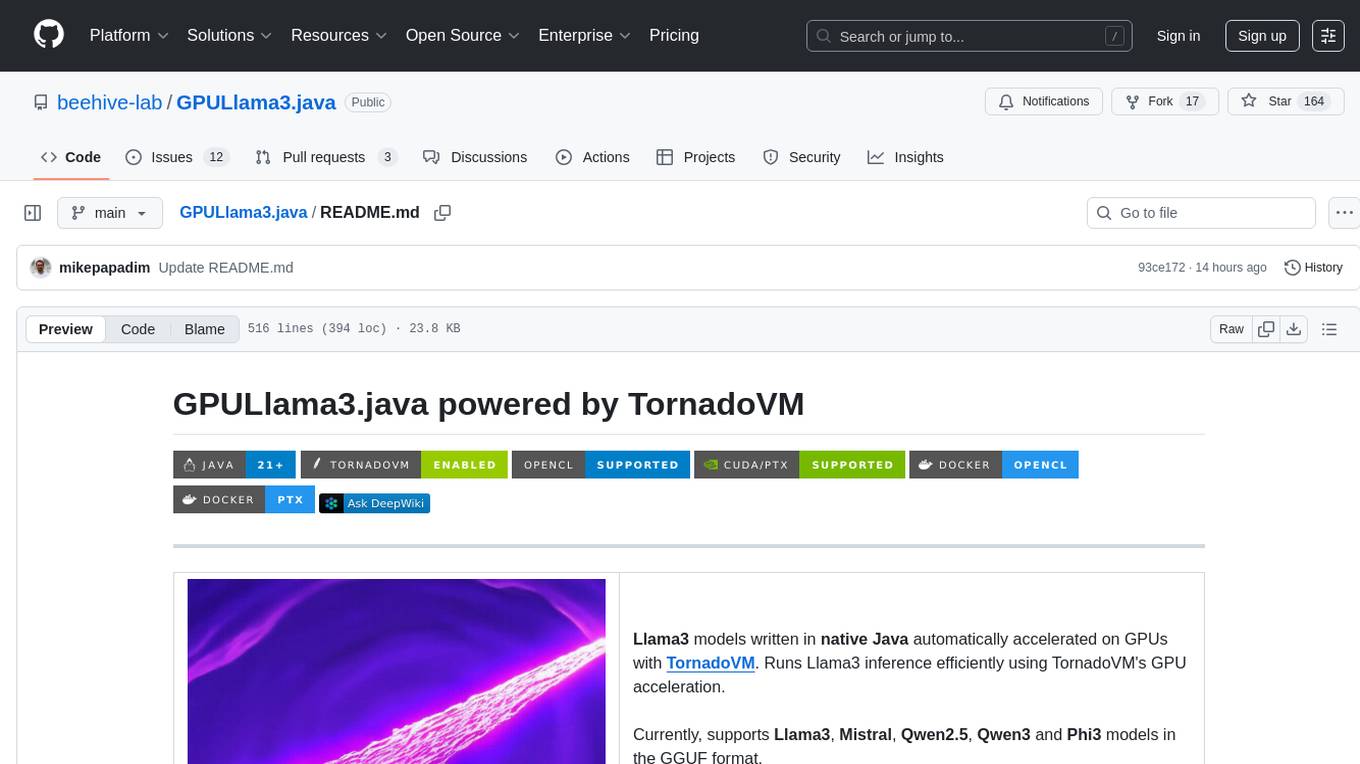
GPULlama3.java
GPULlama3.java powered by TornadoVM is a Java-native implementation of Llama3 that automatically compiles and executes Java code on GPUs via TornadoVM. It supports Llama3, Mistral, Qwen2.5, Qwen3, and Phi3 models in the GGUF format. The repository aims to provide GPU acceleration for Java code, enabling faster execution and high-performance access to off-heap memory. It offers features like interactive and instruction modes, flexible backend switching between OpenCL and PTX, and cross-platform compatibility with NVIDIA, Intel, and Apple GPUs.
For similar tasks

face-api
FaceAPI is an AI-powered tool for face detection, rotation tracking, face description, recognition, age, gender, and emotion prediction. It can be used in both browser and NodeJS environments using TensorFlow/JS. The tool provides live demos for processing images and webcam feeds, along with NodeJS examples for various tasks such as face similarity comparison and multiprocessing. FaceAPI offers different pre-built versions for client-side browser execution and server-side NodeJS execution, with or without TFJS pre-bundled. It is compatible with TFJS 2.0+ and TFJS 3.0+.
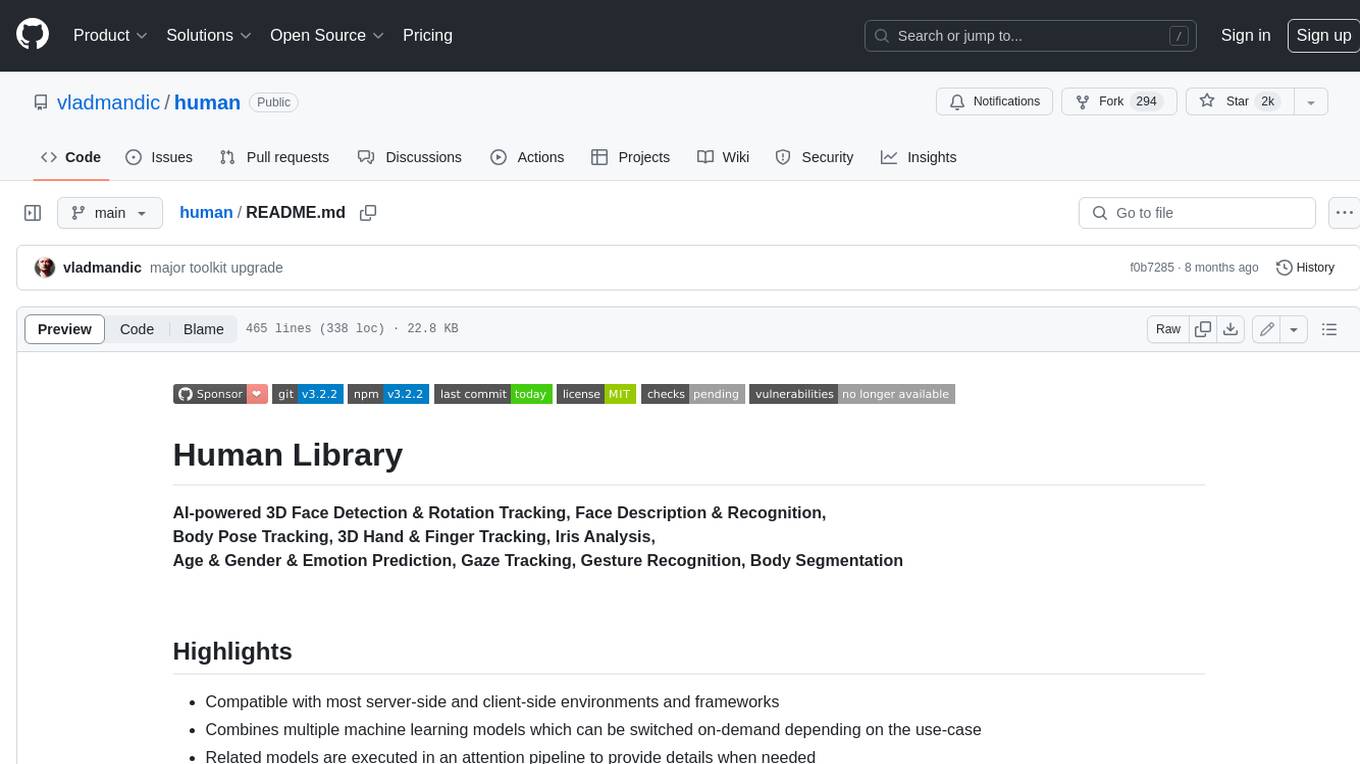
human
AI-powered 3D Face Detection & Rotation Tracking, Face Description & Recognition, Body Pose Tracking, 3D Hand & Finger Tracking, Iris Analysis, Age & Gender & Emotion Prediction, Gaze Tracking, Gesture Recognition, Body Segmentation
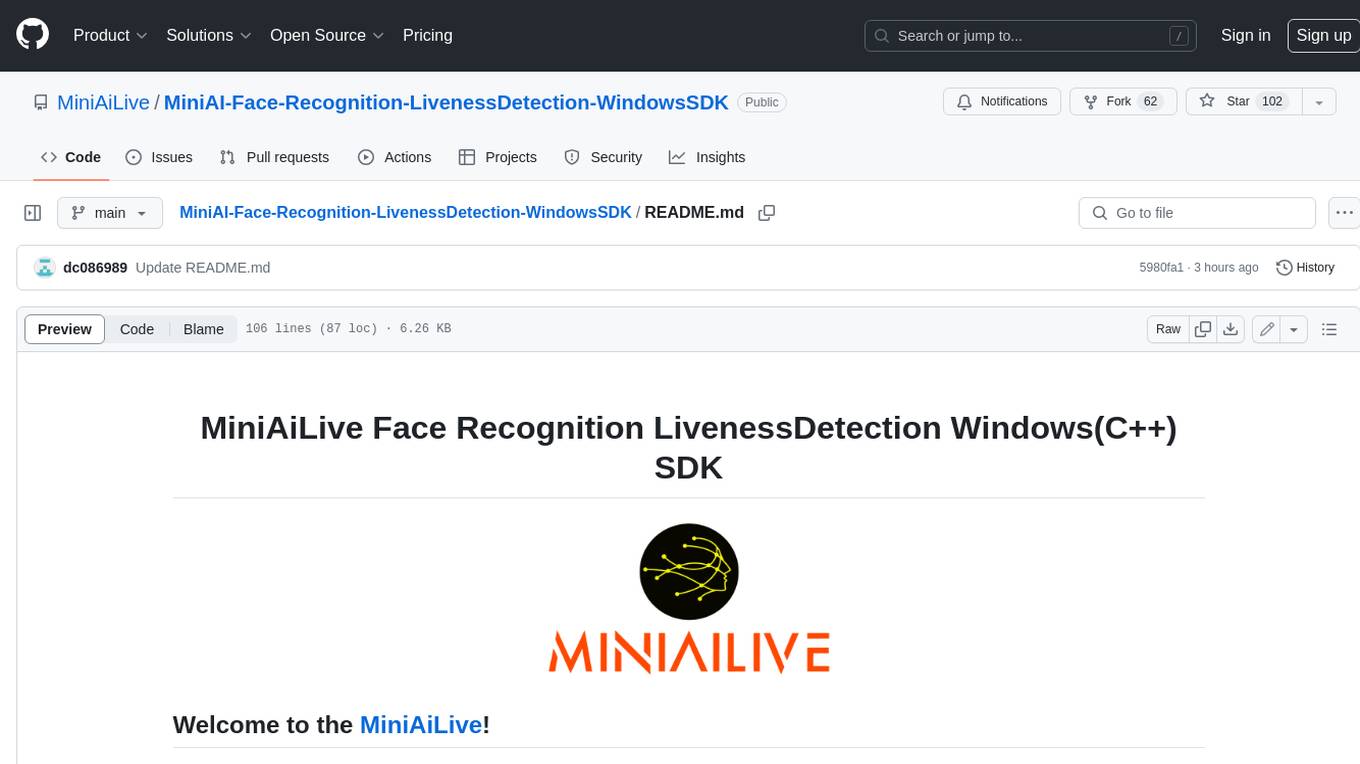
MiniAI-Face-Recognition-LivenessDetection-WindowsSDK
This repository contains a C++ application that demonstrates face recognition capabilities using computer vision techniques. The demo utilizes OpenCV and dlib libraries for efficient face detection and recognition with 3D passive face liveness detection (face anti-spoofing). Key Features: Face detection: The SDK utilizes advanced computer vision techniques to detect faces in images or video frames, enabling a wide range of applications. Face recognition: It can recognize known faces by comparing them with a pre-defined database of individuals. Age estimation: It can estimate the age of detected faces. Gender detection: It can determine the gender of detected faces. Liveness detection: It can detect whether a face is from a live person or a static image.
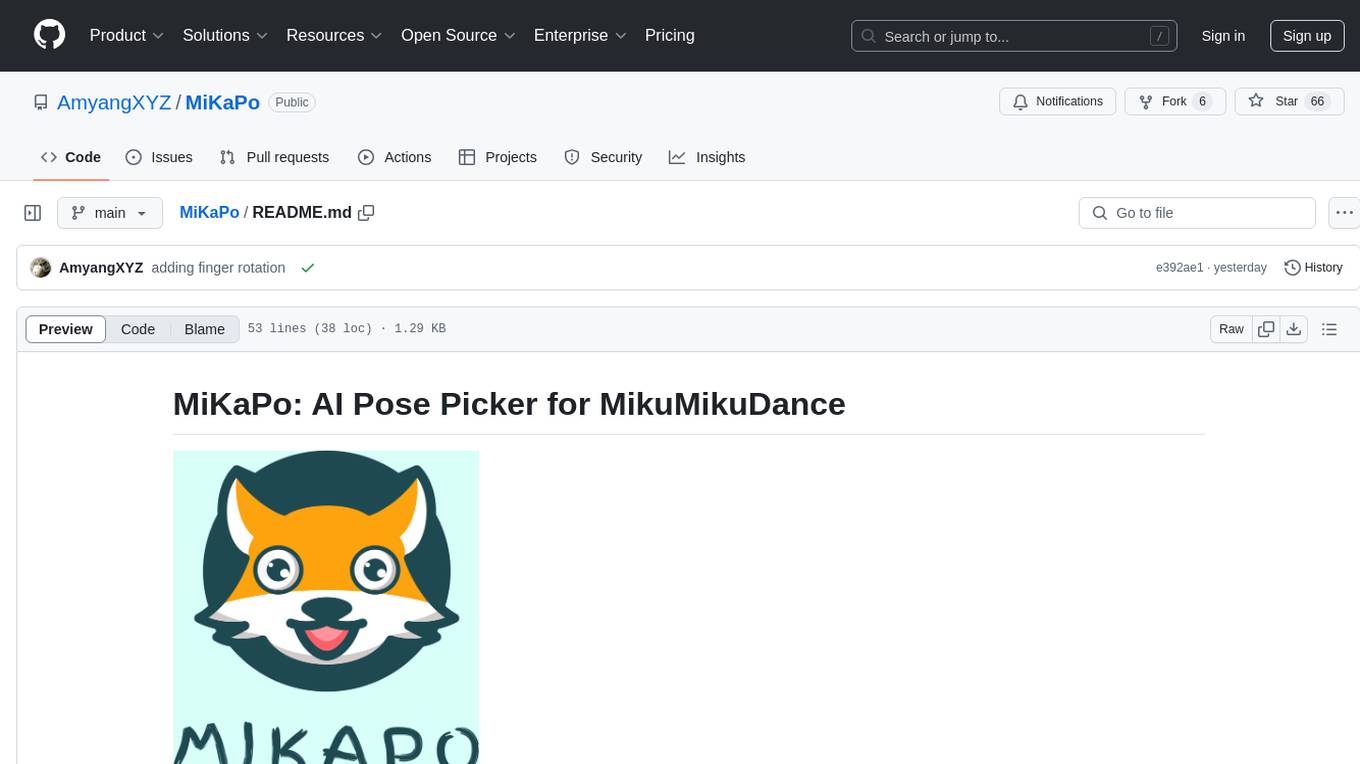
MiKaPo
MiKaPo is a web-based tool that allows users to pose MMD models in real-time using video input. It utilizes technologies such as Mediapipe for 3D key points detection, Babylon.js for 3D scene rendering, babylon-mmd for MMD model viewing, and Vite+React for the web framework. Users can upload videos and images, select different environments, and choose models for posing. MiKaPo also supports camera input and Ollama (electron version). The tool is open to feature requests and pull requests, with ongoing development to add VMD export functionality.
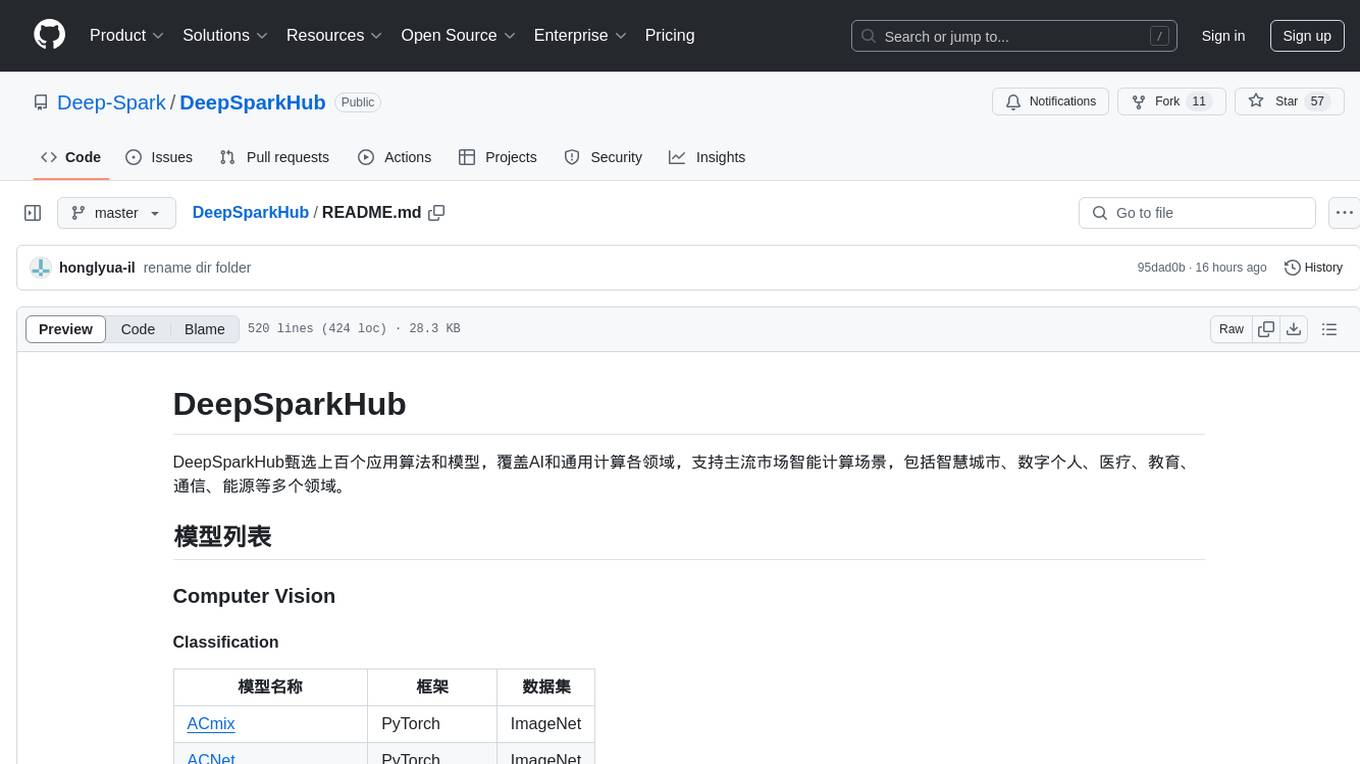
DeepSparkHub
DeepSparkHub is a repository that curates hundreds of application algorithms and models covering various fields in AI and general computing. It supports mainstream intelligent computing scenarios in markets such as smart cities, digital individuals, healthcare, education, communication, energy, and more. The repository provides a wide range of models for tasks such as computer vision, face detection, face recognition, instance segmentation, image generation, knowledge distillation, network pruning, object detection, 3D object detection, OCR, pose estimation, self-supervised learning, semantic segmentation, super resolution, tracking, traffic forecast, GNN, HPC, methodology, multimodal, NLP, recommendation, reinforcement learning, speech recognition, speech synthesis, and 3D reconstruction.
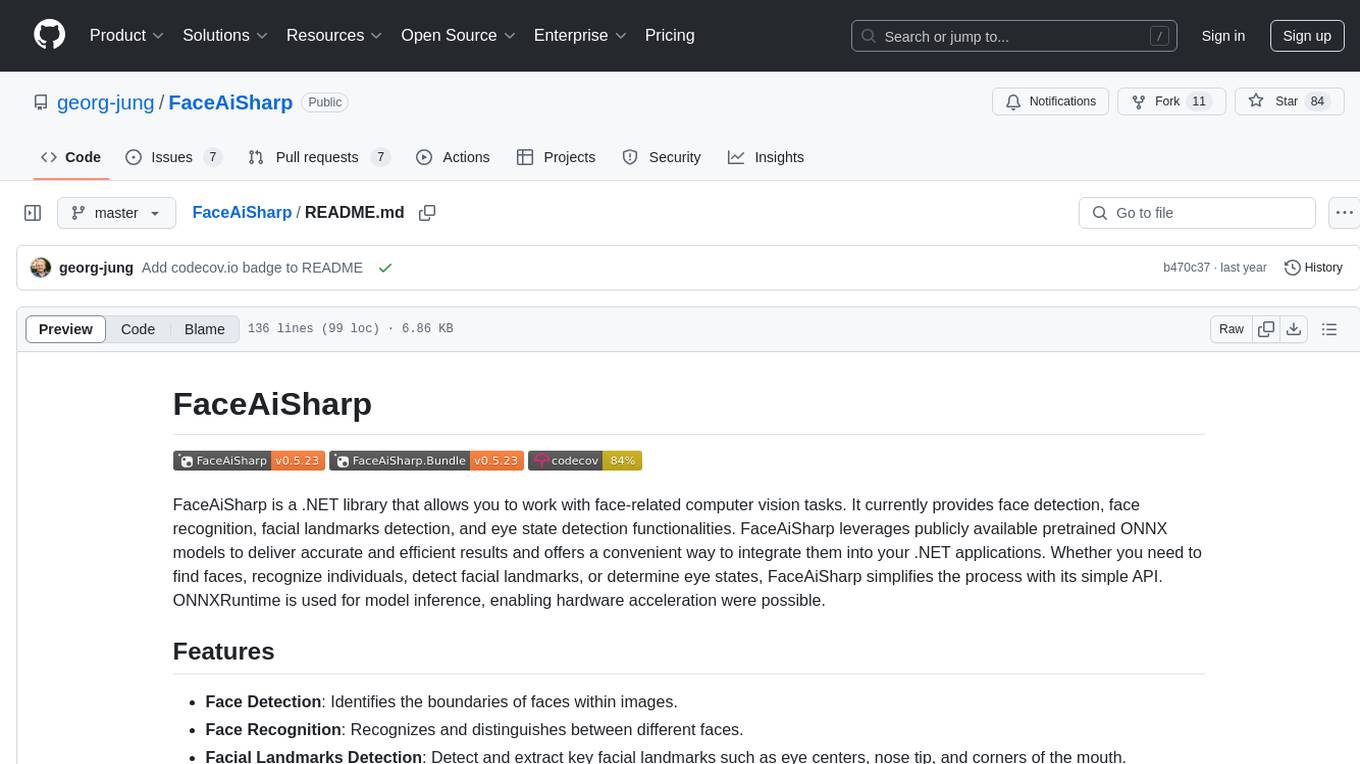
FaceAiSharp
FaceAiSharp is a .NET library designed for face-related computer vision tasks. It offers functionalities such as face detection, face recognition, facial landmarks detection, and eye state detection. The library utilizes pretrained ONNX models for accurate and efficient results, enabling users to integrate these capabilities into their .NET applications easily. With a focus on simplicity and performance, FaceAiSharp provides a local processing solution without relying on cloud services, supporting image-based face processing using ImageSharp. It is cross-platform compatible, supporting Windows, Linux, Android, and more.
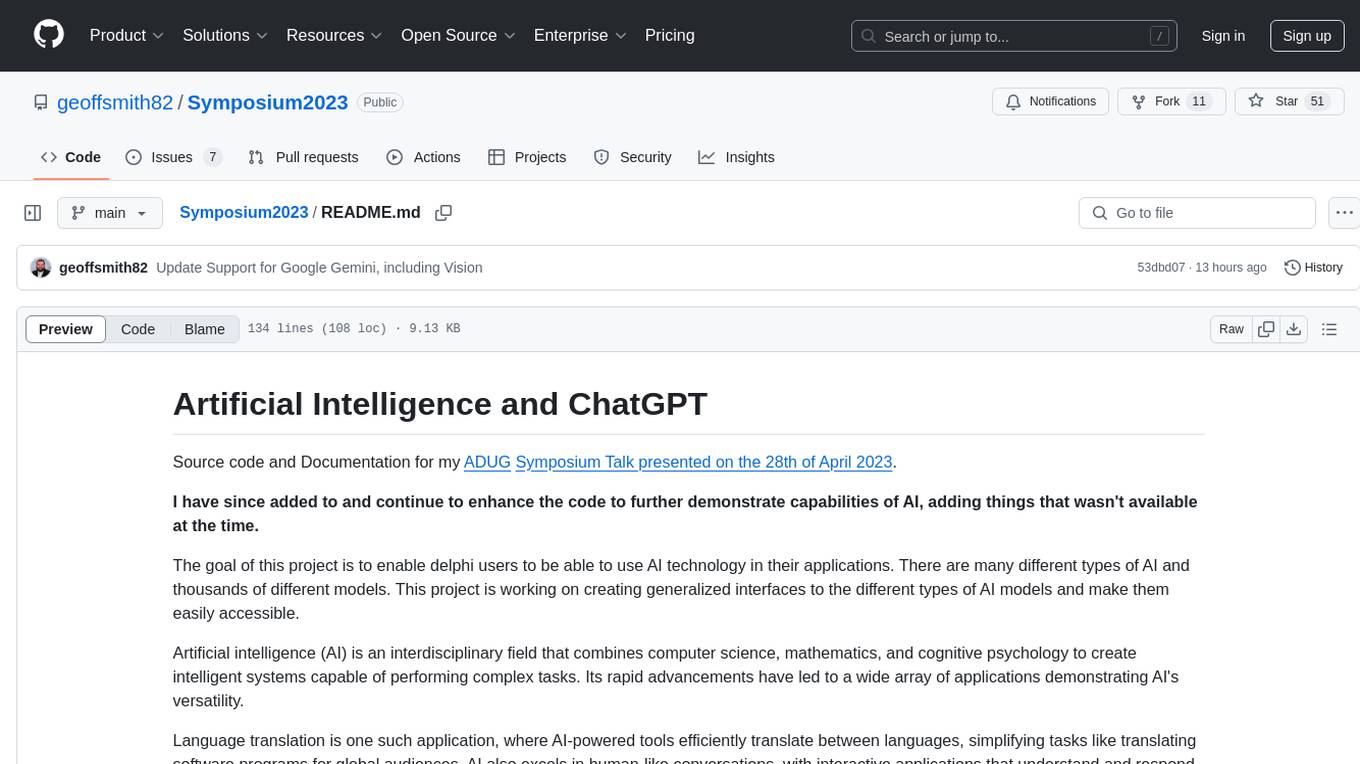
Symposium2023
Symposium2023 is a project aimed at enabling Delphi users to incorporate AI technology into their applications. It provides generalized interfaces to different AI models, making them easily accessible. The project showcases AI's versatility in tasks like language translation, human-like conversations, image generation, data analysis, and more. Users can experiment with different AI models, change providers easily, and avoid vendor lock-in. The project supports various AI features like vision support and function calling, utilizing providers like Google, Microsoft Azure, Amazon, OpenAI, and more. It includes example programs demonstrating tasks such as text-to-speech, language translation, face detection, weather querying, audio transcription, voice recognition, image generation, invoice processing, and API testing. The project also hints at potential future research areas like using embeddings for data search and integrating Python AI libraries with Delphi.
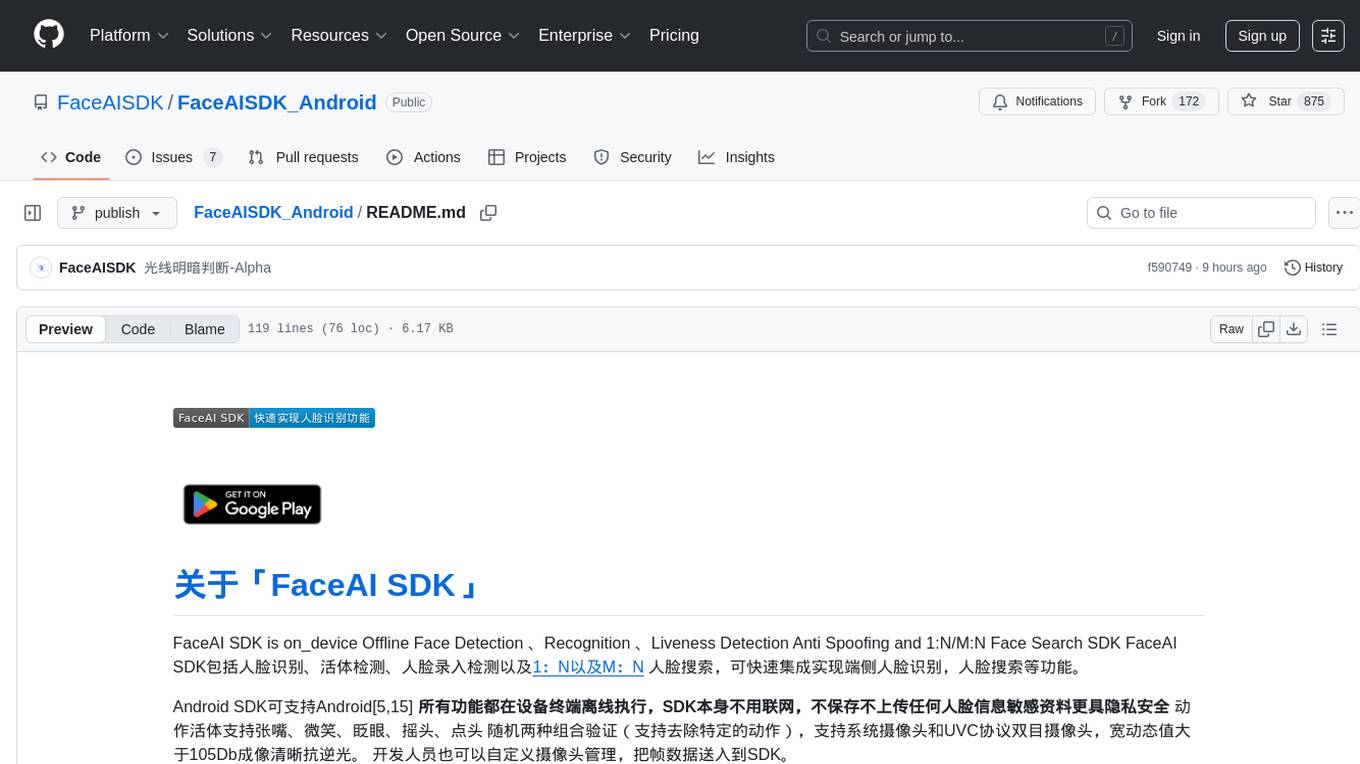
FaceAISDK_Android
FaceAI SDK is an on-device offline face detection, recognition, liveness detection, anti-spoofing, and 1:N/M:N face search SDK. It enables quick integration to achieve on-device face recognition, face search, and other functions. The SDK performs all functions offline on the device without the need for internet connection, ensuring privacy and security. It supports various actions for liveness detection, custom camera management, and clear imaging even in challenging lighting conditions.
For similar jobs

promptflow
**Prompt flow** is a suite of development tools designed to streamline the end-to-end development cycle of LLM-based AI applications, from ideation, prototyping, testing, evaluation to production deployment and monitoring. It makes prompt engineering much easier and enables you to build LLM apps with production quality.

deepeval
DeepEval is a simple-to-use, open-source LLM evaluation framework specialized for unit testing LLM outputs. It incorporates various metrics such as G-Eval, hallucination, answer relevancy, RAGAS, etc., and runs locally on your machine for evaluation. It provides a wide range of ready-to-use evaluation metrics, allows for creating custom metrics, integrates with any CI/CD environment, and enables benchmarking LLMs on popular benchmarks. DeepEval is designed for evaluating RAG and fine-tuning applications, helping users optimize hyperparameters, prevent prompt drifting, and transition from OpenAI to hosting their own Llama2 with confidence.

MegaDetector
MegaDetector is an AI model that identifies animals, people, and vehicles in camera trap images (which also makes it useful for eliminating blank images). This model is trained on several million images from a variety of ecosystems. MegaDetector is just one of many tools that aims to make conservation biologists more efficient with AI. If you want to learn about other ways to use AI to accelerate camera trap workflows, check out our of the field, affectionately titled "Everything I know about machine learning and camera traps".

leapfrogai
LeapfrogAI is a self-hosted AI platform designed to be deployed in air-gapped resource-constrained environments. It brings sophisticated AI solutions to these environments by hosting all the necessary components of an AI stack, including vector databases, model backends, API, and UI. LeapfrogAI's API closely matches that of OpenAI, allowing tools built for OpenAI/ChatGPT to function seamlessly with a LeapfrogAI backend. It provides several backends for various use cases, including llama-cpp-python, whisper, text-embeddings, and vllm. LeapfrogAI leverages Chainguard's apko to harden base python images, ensuring the latest supported Python versions are used by the other components of the stack. The LeapfrogAI SDK provides a standard set of protobuffs and python utilities for implementing backends and gRPC. LeapfrogAI offers UI options for common use-cases like chat, summarization, and transcription. It can be deployed and run locally via UDS and Kubernetes, built out using Zarf packages. LeapfrogAI is supported by a community of users and contributors, including Defense Unicorns, Beast Code, Chainguard, Exovera, Hypergiant, Pulze, SOSi, United States Navy, United States Air Force, and United States Space Force.

llava-docker
This Docker image for LLaVA (Large Language and Vision Assistant) provides a convenient way to run LLaVA locally or on RunPod. LLaVA is a powerful AI tool that combines natural language processing and computer vision capabilities. With this Docker image, you can easily access LLaVA's functionalities for various tasks, including image captioning, visual question answering, text summarization, and more. The image comes pre-installed with LLaVA v1.2.0, Torch 2.1.2, xformers 0.0.23.post1, and other necessary dependencies. You can customize the model used by setting the MODEL environment variable. The image also includes a Jupyter Lab environment for interactive development and exploration. Overall, this Docker image offers a comprehensive and user-friendly platform for leveraging LLaVA's capabilities.

carrot
The 'carrot' repository on GitHub provides a list of free and user-friendly ChatGPT mirror sites for easy access. The repository includes sponsored sites offering various GPT models and services. Users can find and share sites, report errors, and access stable and recommended sites for ChatGPT usage. The repository also includes a detailed list of ChatGPT sites, their features, and accessibility options, making it a valuable resource for ChatGPT users seeking free and unlimited GPT services.

TrustLLM
TrustLLM is a comprehensive study of trustworthiness in LLMs, including principles for different dimensions of trustworthiness, established benchmark, evaluation, and analysis of trustworthiness for mainstream LLMs, and discussion of open challenges and future directions. Specifically, we first propose a set of principles for trustworthy LLMs that span eight different dimensions. Based on these principles, we further establish a benchmark across six dimensions including truthfulness, safety, fairness, robustness, privacy, and machine ethics. We then present a study evaluating 16 mainstream LLMs in TrustLLM, consisting of over 30 datasets. The document explains how to use the trustllm python package to help you assess the performance of your LLM in trustworthiness more quickly. For more details about TrustLLM, please refer to project website.

AI-YinMei
AI-YinMei is an AI virtual anchor Vtuber development tool (N card version). It supports fastgpt knowledge base chat dialogue, a complete set of solutions for LLM large language models: [fastgpt] + [one-api] + [Xinference], supports docking bilibili live broadcast barrage reply and entering live broadcast welcome speech, supports Microsoft edge-tts speech synthesis, supports Bert-VITS2 speech synthesis, supports GPT-SoVITS speech synthesis, supports expression control Vtuber Studio, supports painting stable-diffusion-webui output OBS live broadcast room, supports painting picture pornography public-NSFW-y-distinguish, supports search and image search service duckduckgo (requires magic Internet access), supports image search service Baidu image search (no magic Internet access), supports AI reply chat box [html plug-in], supports AI singing Auto-Convert-Music, supports playlist [html plug-in], supports dancing function, supports expression video playback, supports head touching action, supports gift smashing action, supports singing automatic start dancing function, chat and singing automatic cycle swing action, supports multi scene switching, background music switching, day and night automatic switching scene, supports open singing and painting, let AI automatically judge the content.













